Impact of AI Technology on Aviation Industry
VerifiedAdded on 2023/06/10
|16
|6477
|356
AI Summary
This essay analyzes the impact of AI technology on the aviation industry, including its use in airport management and improving the flying experience. It also discusses the benefits and challenges of AI implementation in the industry.
Contribute Materials
Your contribution can guide someone’s learning journey. Share your
documents today.

SPECIALIST PROJECT
1
1
Secure Best Marks with AI Grader
Need help grading? Try our AI Grader for instant feedback on your assignments.
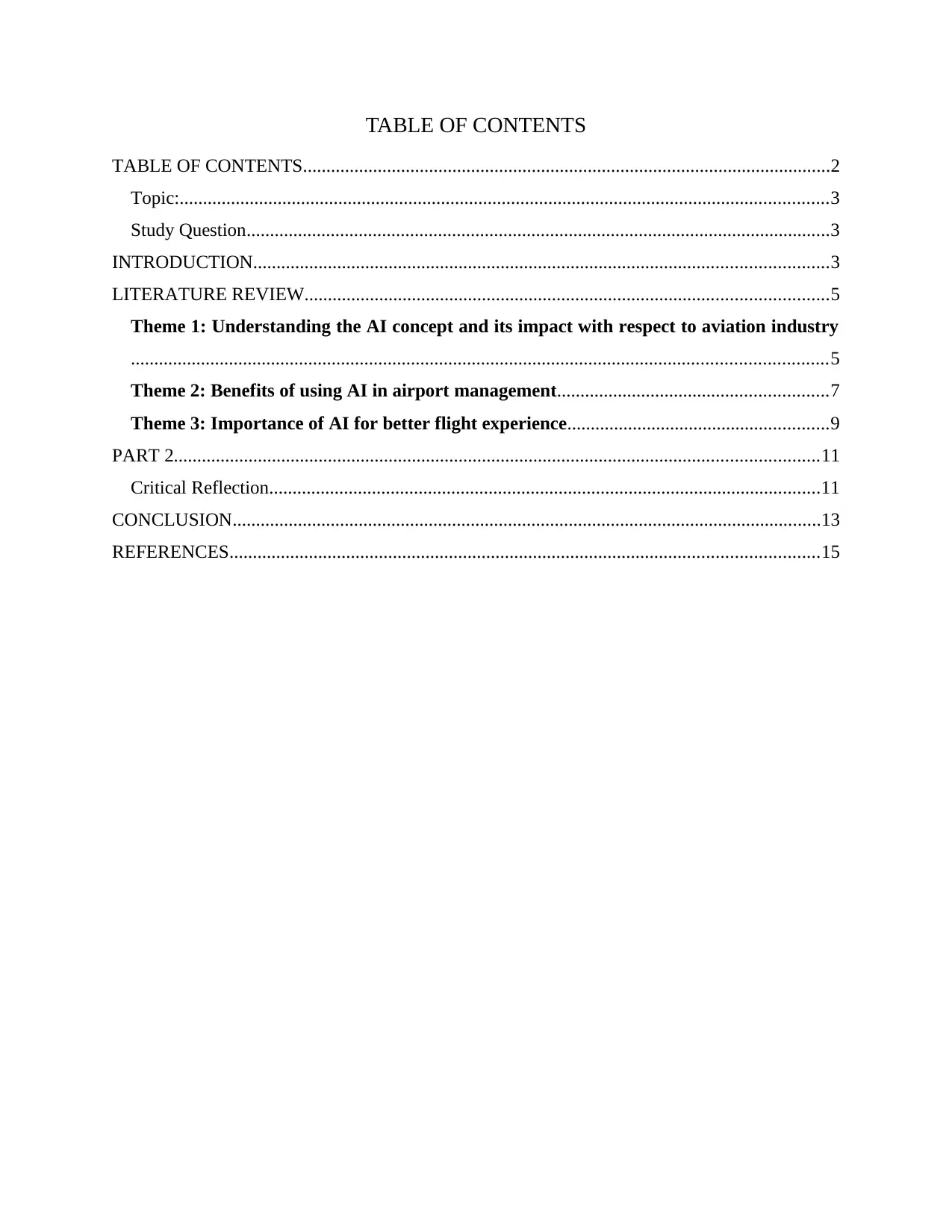
TABLE OF CONTENTS
TABLE OF CONTENTS.................................................................................................................2
Topic:...........................................................................................................................................3
Study Question.............................................................................................................................3
INTRODUCTION...........................................................................................................................3
LITERATURE REVIEW................................................................................................................5
Theme 1: Understanding the AI concept and its impact with respect to aviation industry
.....................................................................................................................................................5
Theme 2: Benefits of using AI in airport management..........................................................7
Theme 3: Importance of AI for better flight experience........................................................9
PART 2..........................................................................................................................................11
Critical Reflection......................................................................................................................11
CONCLUSION..............................................................................................................................13
REFERENCES..............................................................................................................................15
TABLE OF CONTENTS.................................................................................................................2
Topic:...........................................................................................................................................3
Study Question.............................................................................................................................3
INTRODUCTION...........................................................................................................................3
LITERATURE REVIEW................................................................................................................5
Theme 1: Understanding the AI concept and its impact with respect to aviation industry
.....................................................................................................................................................5
Theme 2: Benefits of using AI in airport management..........................................................7
Theme 3: Importance of AI for better flight experience........................................................9
PART 2..........................................................................................................................................11
Critical Reflection......................................................................................................................11
CONCLUSION..............................................................................................................................13
REFERENCES..............................................................................................................................15
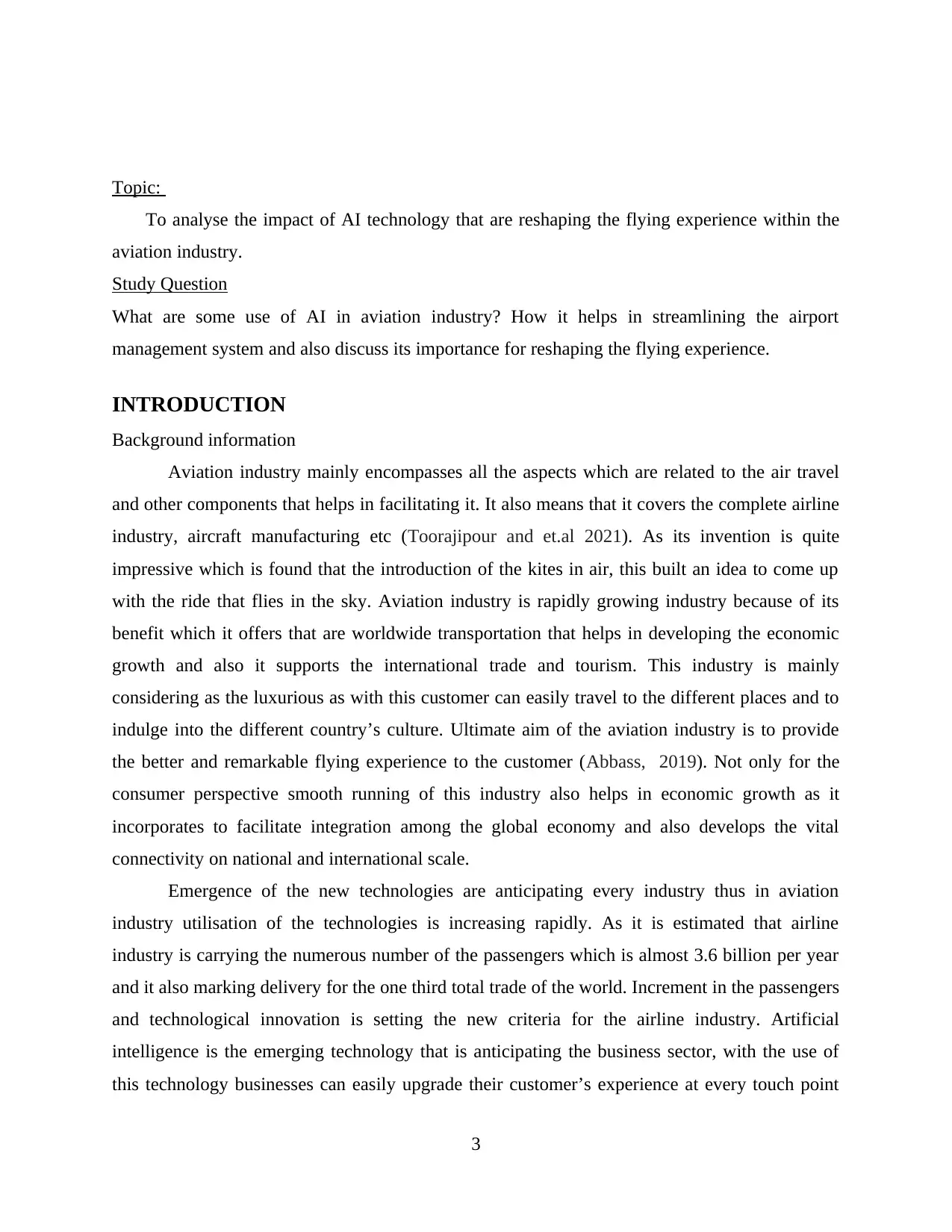
Topic:
To analyse the impact of AI technology that are reshaping the flying experience within the
aviation industry.
Study Question
What are some use of AI in aviation industry? How it helps in streamlining the airport
management system and also discuss its importance for reshaping the flying experience.
INTRODUCTION
Background information
Aviation industry mainly encompasses all the aspects which are related to the air travel
and other components that helps in facilitating it. It also means that it covers the complete airline
industry, aircraft manufacturing etc (Toorajipour and et.al 2021). As its invention is quite
impressive which is found that the introduction of the kites in air, this built an idea to come up
with the ride that flies in the sky. Aviation industry is rapidly growing industry because of its
benefit which it offers that are worldwide transportation that helps in developing the economic
growth and also it supports the international trade and tourism. This industry is mainly
considering as the luxurious as with this customer can easily travel to the different places and to
indulge into the different country’s culture. Ultimate aim of the aviation industry is to provide
the better and remarkable flying experience to the customer (Abbass, 2019). Not only for the
consumer perspective smooth running of this industry also helps in economic growth as it
incorporates to facilitate integration among the global economy and also develops the vital
connectivity on national and international scale.
Emergence of the new technologies are anticipating every industry thus in aviation
industry utilisation of the technologies is increasing rapidly. As it is estimated that airline
industry is carrying the numerous number of the passengers which is almost 3.6 billion per year
and it also marking delivery for the one third total trade of the world. Increment in the passengers
and technological innovation is setting the new criteria for the airline industry. Artificial
intelligence is the emerging technology that is anticipating the business sector, with the use of
this technology businesses can easily upgrade their customer’s experience at every touch point
3
To analyse the impact of AI technology that are reshaping the flying experience within the
aviation industry.
Study Question
What are some use of AI in aviation industry? How it helps in streamlining the airport
management system and also discuss its importance for reshaping the flying experience.
INTRODUCTION
Background information
Aviation industry mainly encompasses all the aspects which are related to the air travel
and other components that helps in facilitating it. It also means that it covers the complete airline
industry, aircraft manufacturing etc (Toorajipour and et.al 2021). As its invention is quite
impressive which is found that the introduction of the kites in air, this built an idea to come up
with the ride that flies in the sky. Aviation industry is rapidly growing industry because of its
benefit which it offers that are worldwide transportation that helps in developing the economic
growth and also it supports the international trade and tourism. This industry is mainly
considering as the luxurious as with this customer can easily travel to the different places and to
indulge into the different country’s culture. Ultimate aim of the aviation industry is to provide
the better and remarkable flying experience to the customer (Abbass, 2019). Not only for the
consumer perspective smooth running of this industry also helps in economic growth as it
incorporates to facilitate integration among the global economy and also develops the vital
connectivity on national and international scale.
Emergence of the new technologies are anticipating every industry thus in aviation
industry utilisation of the technologies is increasing rapidly. As it is estimated that airline
industry is carrying the numerous number of the passengers which is almost 3.6 billion per year
and it also marking delivery for the one third total trade of the world. Increment in the passengers
and technological innovation is setting the new criteria for the airline industry. Artificial
intelligence is the emerging technology that is anticipating the business sector, with the use of
this technology businesses can easily upgrade their customer’s experience at every touch point
3
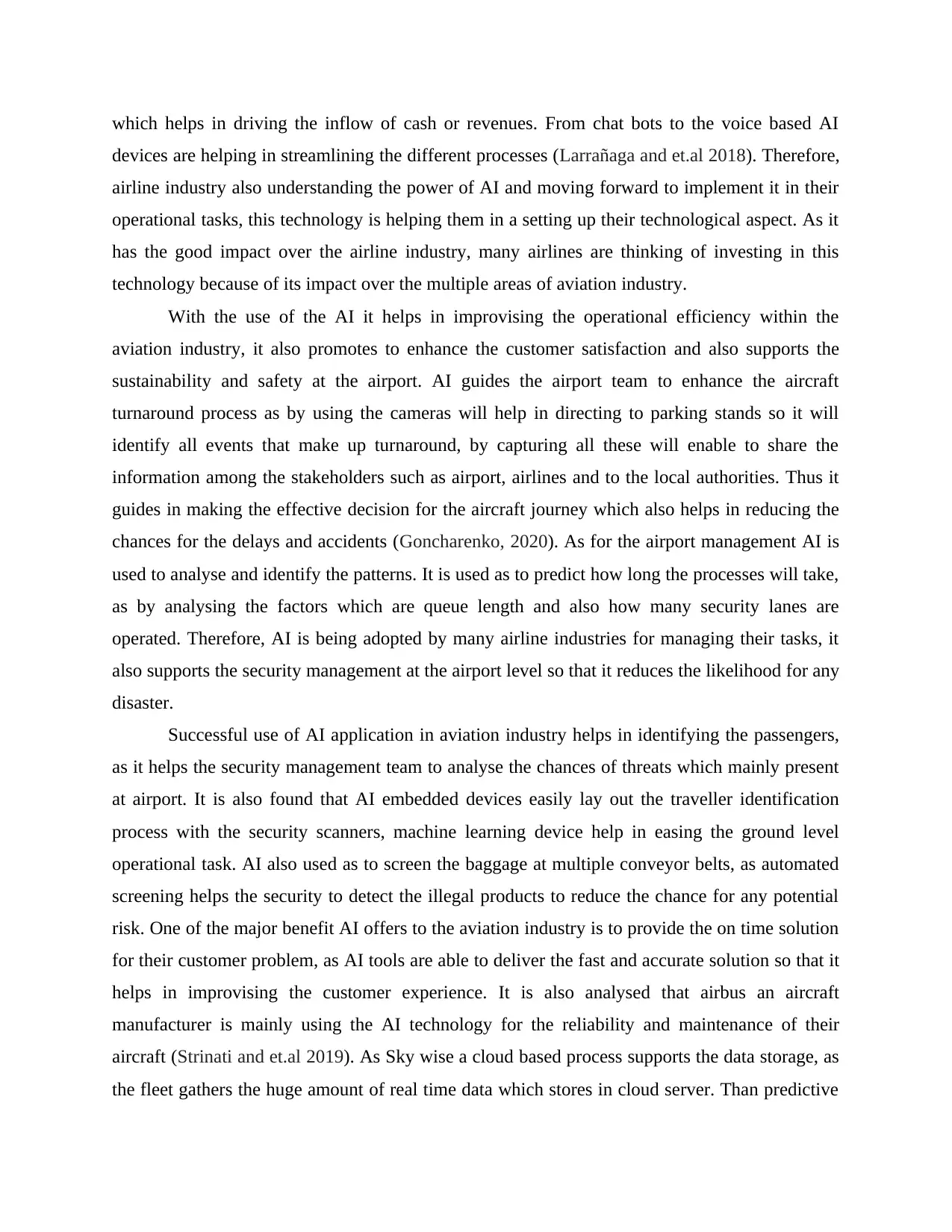
which helps in driving the inflow of cash or revenues. From chat bots to the voice based AI
devices are helping in streamlining the different processes (Larrañaga and et.al 2018). Therefore,
airline industry also understanding the power of AI and moving forward to implement it in their
operational tasks, this technology is helping them in a setting up their technological aspect. As it
has the good impact over the airline industry, many airlines are thinking of investing in this
technology because of its impact over the multiple areas of aviation industry.
With the use of the AI it helps in improvising the operational efficiency within the
aviation industry, it also promotes to enhance the customer satisfaction and also supports the
sustainability and safety at the airport. AI guides the airport team to enhance the aircraft
turnaround process as by using the cameras will help in directing to parking stands so it will
identify all events that make up turnaround, by capturing all these will enable to share the
information among the stakeholders such as airport, airlines and to the local authorities. Thus it
guides in making the effective decision for the aircraft journey which also helps in reducing the
chances for the delays and accidents (Goncharenko, 2020). As for the airport management AI is
used to analyse and identify the patterns. It is used as to predict how long the processes will take,
as by analysing the factors which are queue length and also how many security lanes are
operated. Therefore, AI is being adopted by many airline industries for managing their tasks, it
also supports the security management at the airport level so that it reduces the likelihood for any
disaster.
Successful use of AI application in aviation industry helps in identifying the passengers,
as it helps the security management team to analyse the chances of threats which mainly present
at airport. It is also found that AI embedded devices easily lay out the traveller identification
process with the security scanners, machine learning device help in easing the ground level
operational task. AI also used as to screen the baggage at multiple conveyor belts, as automated
screening helps the security to detect the illegal products to reduce the chance for any potential
risk. One of the major benefit AI offers to the aviation industry is to provide the on time solution
for their customer problem, as AI tools are able to deliver the fast and accurate solution so that it
helps in improvising the customer experience. It is also analysed that airbus an aircraft
manufacturer is mainly using the AI technology for the reliability and maintenance of their
aircraft (Strinati and et.al 2019). As Sky wise a cloud based process supports the data storage, as
the fleet gathers the huge amount of real time data which stores in cloud server. Than predictive
devices are helping in streamlining the different processes (Larrañaga and et.al 2018). Therefore,
airline industry also understanding the power of AI and moving forward to implement it in their
operational tasks, this technology is helping them in a setting up their technological aspect. As it
has the good impact over the airline industry, many airlines are thinking of investing in this
technology because of its impact over the multiple areas of aviation industry.
With the use of the AI it helps in improvising the operational efficiency within the
aviation industry, it also promotes to enhance the customer satisfaction and also supports the
sustainability and safety at the airport. AI guides the airport team to enhance the aircraft
turnaround process as by using the cameras will help in directing to parking stands so it will
identify all events that make up turnaround, by capturing all these will enable to share the
information among the stakeholders such as airport, airlines and to the local authorities. Thus it
guides in making the effective decision for the aircraft journey which also helps in reducing the
chances for the delays and accidents (Goncharenko, 2020). As for the airport management AI is
used to analyse and identify the patterns. It is used as to predict how long the processes will take,
as by analysing the factors which are queue length and also how many security lanes are
operated. Therefore, AI is being adopted by many airline industries for managing their tasks, it
also supports the security management at the airport level so that it reduces the likelihood for any
disaster.
Successful use of AI application in aviation industry helps in identifying the passengers,
as it helps the security management team to analyse the chances of threats which mainly present
at airport. It is also found that AI embedded devices easily lay out the traveller identification
process with the security scanners, machine learning device help in easing the ground level
operational task. AI also used as to screen the baggage at multiple conveyor belts, as automated
screening helps the security to detect the illegal products to reduce the chance for any potential
risk. One of the major benefit AI offers to the aviation industry is to provide the on time solution
for their customer problem, as AI tools are able to deliver the fast and accurate solution so that it
helps in improvising the customer experience. It is also analysed that airbus an aircraft
manufacturer is mainly using the AI technology for the reliability and maintenance of their
aircraft (Strinati and et.al 2019). As Sky wise a cloud based process supports the data storage, as
the fleet gathers the huge amount of real time data which stores in cloud server. Than predictive
Secure Best Marks with AI Grader
Need help grading? Try our AI Grader for instant feedback on your assignments.
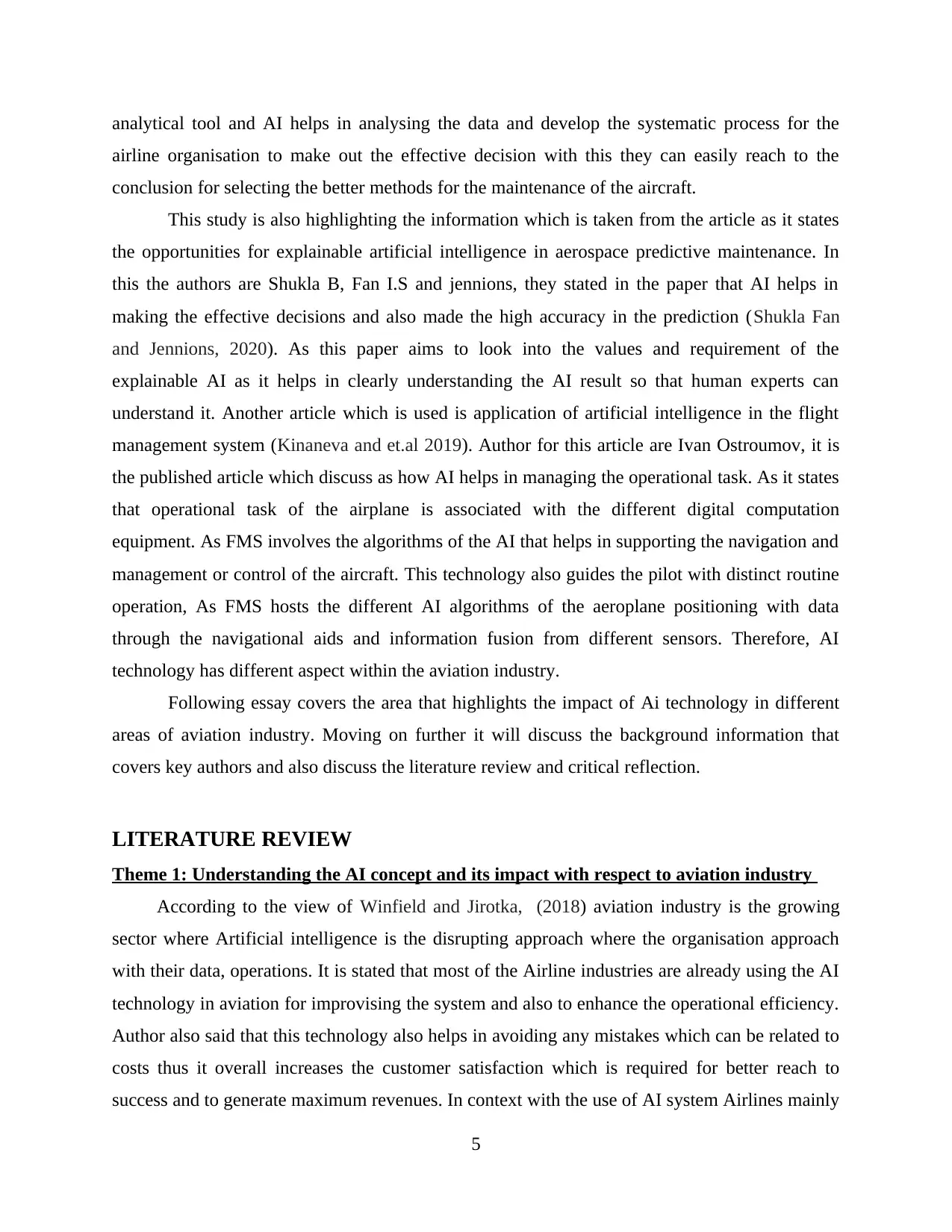
analytical tool and AI helps in analysing the data and develop the systematic process for the
airline organisation to make out the effective decision with this they can easily reach to the
conclusion for selecting the better methods for the maintenance of the aircraft.
This study is also highlighting the information which is taken from the article as it states
the opportunities for explainable artificial intelligence in aerospace predictive maintenance. In
this the authors are Shukla B, Fan I.S and jennions, they stated in the paper that AI helps in
making the effective decisions and also made the high accuracy in the prediction (Shukla Fan
and Jennions, 2020). As this paper aims to look into the values and requirement of the
explainable AI as it helps in clearly understanding the AI result so that human experts can
understand it. Another article which is used is application of artificial intelligence in the flight
management system (Kinaneva and et.al 2019). Author for this article are Ivan Ostroumov, it is
the published article which discuss as how AI helps in managing the operational task. As it states
that operational task of the airplane is associated with the different digital computation
equipment. As FMS involves the algorithms of the AI that helps in supporting the navigation and
management or control of the aircraft. This technology also guides the pilot with distinct routine
operation, As FMS hosts the different AI algorithms of the aeroplane positioning with data
through the navigational aids and information fusion from different sensors. Therefore, AI
technology has different aspect within the aviation industry.
Following essay covers the area that highlights the impact of Ai technology in different
areas of aviation industry. Moving on further it will discuss the background information that
covers key authors and also discuss the literature review and critical reflection.
LITERATURE REVIEW
Theme 1: Understanding the AI concept and its impact with respect to aviation industry
According to the view of Winfield and Jirotka, (2018) aviation industry is the growing
sector where Artificial intelligence is the disrupting approach where the organisation approach
with their data, operations. It is stated that most of the Airline industries are already using the AI
technology in aviation for improvising the system and also to enhance the operational efficiency.
Author also said that this technology also helps in avoiding any mistakes which can be related to
costs thus it overall increases the customer satisfaction which is required for better reach to
success and to generate maximum revenues. In context with the use of AI system Airlines mainly
5
airline organisation to make out the effective decision with this they can easily reach to the
conclusion for selecting the better methods for the maintenance of the aircraft.
This study is also highlighting the information which is taken from the article as it states
the opportunities for explainable artificial intelligence in aerospace predictive maintenance. In
this the authors are Shukla B, Fan I.S and jennions, they stated in the paper that AI helps in
making the effective decisions and also made the high accuracy in the prediction (Shukla Fan
and Jennions, 2020). As this paper aims to look into the values and requirement of the
explainable AI as it helps in clearly understanding the AI result so that human experts can
understand it. Another article which is used is application of artificial intelligence in the flight
management system (Kinaneva and et.al 2019). Author for this article are Ivan Ostroumov, it is
the published article which discuss as how AI helps in managing the operational task. As it states
that operational task of the airplane is associated with the different digital computation
equipment. As FMS involves the algorithms of the AI that helps in supporting the navigation and
management or control of the aircraft. This technology also guides the pilot with distinct routine
operation, As FMS hosts the different AI algorithms of the aeroplane positioning with data
through the navigational aids and information fusion from different sensors. Therefore, AI
technology has different aspect within the aviation industry.
Following essay covers the area that highlights the impact of Ai technology in different
areas of aviation industry. Moving on further it will discuss the background information that
covers key authors and also discuss the literature review and critical reflection.
LITERATURE REVIEW
Theme 1: Understanding the AI concept and its impact with respect to aviation industry
According to the view of Winfield and Jirotka, (2018) aviation industry is the growing
sector where Artificial intelligence is the disrupting approach where the organisation approach
with their data, operations. It is stated that most of the Airline industries are already using the AI
technology in aviation for improvising the system and also to enhance the operational efficiency.
Author also said that this technology also helps in avoiding any mistakes which can be related to
costs thus it overall increases the customer satisfaction which is required for better reach to
success and to generate maximum revenues. In context with the use of AI system Airlines mainly
5
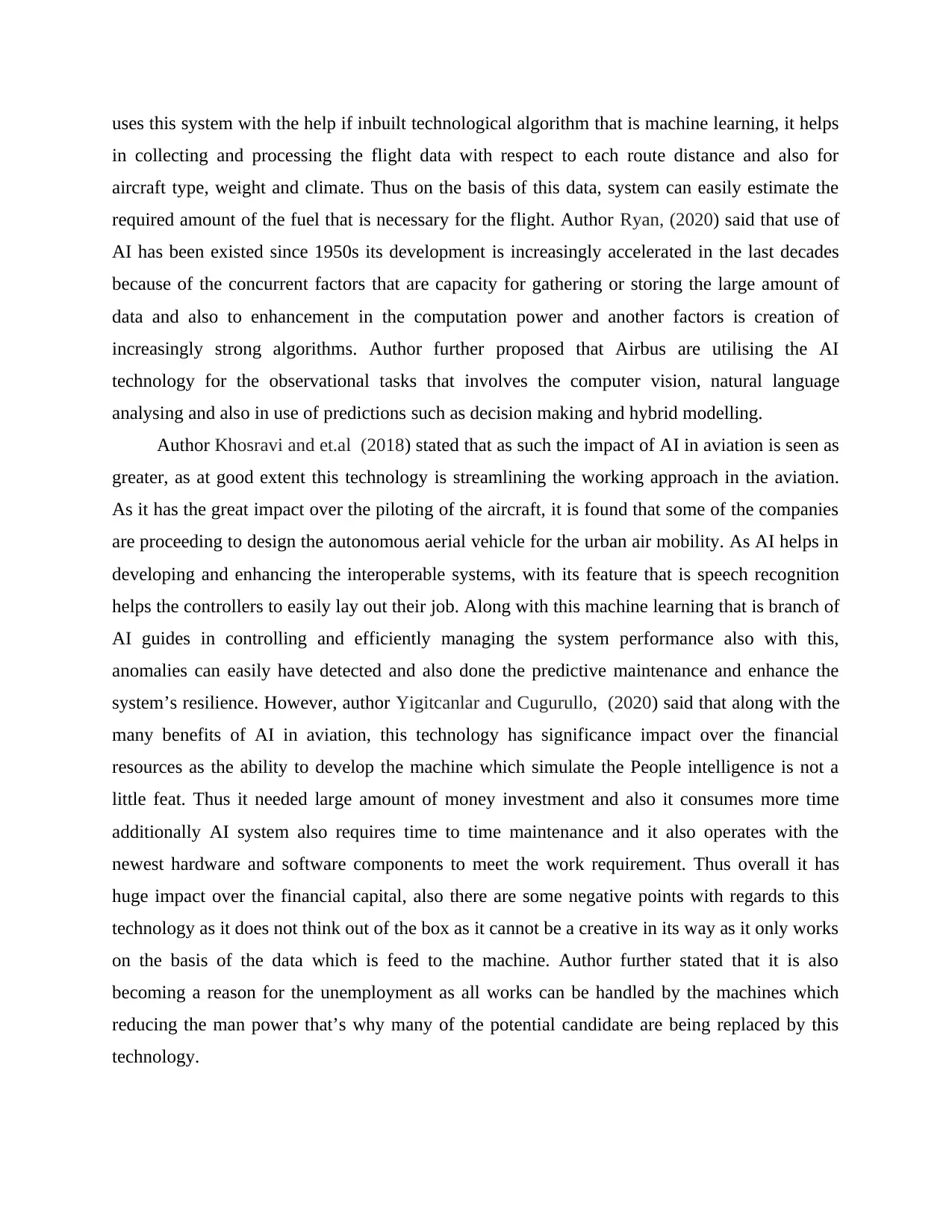
uses this system with the help if inbuilt technological algorithm that is machine learning, it helps
in collecting and processing the flight data with respect to each route distance and also for
aircraft type, weight and climate. Thus on the basis of this data, system can easily estimate the
required amount of the fuel that is necessary for the flight. Author Ryan, (2020) said that use of
AI has been existed since 1950s its development is increasingly accelerated in the last decades
because of the concurrent factors that are capacity for gathering or storing the large amount of
data and also to enhancement in the computation power and another factors is creation of
increasingly strong algorithms. Author further proposed that Airbus are utilising the AI
technology for the observational tasks that involves the computer vision, natural language
analysing and also in use of predictions such as decision making and hybrid modelling.
Author Khosravi and et.al (2018) stated that as such the impact of AI in aviation is seen as
greater, as at good extent this technology is streamlining the working approach in the aviation.
As it has the great impact over the piloting of the aircraft, it is found that some of the companies
are proceeding to design the autonomous aerial vehicle for the urban air mobility. As AI helps in
developing and enhancing the interoperable systems, with its feature that is speech recognition
helps the controllers to easily lay out their job. Along with this machine learning that is branch of
AI guides in controlling and efficiently managing the system performance also with this,
anomalies can easily have detected and also done the predictive maintenance and enhance the
system’s resilience. However, author Yigitcanlar and Cugurullo, (2020) said that along with the
many benefits of AI in aviation, this technology has significance impact over the financial
resources as the ability to develop the machine which simulate the People intelligence is not a
little feat. Thus it needed large amount of money investment and also it consumes more time
additionally AI system also requires time to time maintenance and it also operates with the
newest hardware and software components to meet the work requirement. Thus overall it has
huge impact over the financial capital, also there are some negative points with regards to this
technology as it does not think out of the box as it cannot be a creative in its way as it only works
on the basis of the data which is feed to the machine. Author further stated that it is also
becoming a reason for the unemployment as all works can be handled by the machines which
reducing the man power that’s why many of the potential candidate are being replaced by this
technology.
in collecting and processing the flight data with respect to each route distance and also for
aircraft type, weight and climate. Thus on the basis of this data, system can easily estimate the
required amount of the fuel that is necessary for the flight. Author Ryan, (2020) said that use of
AI has been existed since 1950s its development is increasingly accelerated in the last decades
because of the concurrent factors that are capacity for gathering or storing the large amount of
data and also to enhancement in the computation power and another factors is creation of
increasingly strong algorithms. Author further proposed that Airbus are utilising the AI
technology for the observational tasks that involves the computer vision, natural language
analysing and also in use of predictions such as decision making and hybrid modelling.
Author Khosravi and et.al (2018) stated that as such the impact of AI in aviation is seen as
greater, as at good extent this technology is streamlining the working approach in the aviation.
As it has the great impact over the piloting of the aircraft, it is found that some of the companies
are proceeding to design the autonomous aerial vehicle for the urban air mobility. As AI helps in
developing and enhancing the interoperable systems, with its feature that is speech recognition
helps the controllers to easily lay out their job. Along with this machine learning that is branch of
AI guides in controlling and efficiently managing the system performance also with this,
anomalies can easily have detected and also done the predictive maintenance and enhance the
system’s resilience. However, author Yigitcanlar and Cugurullo, (2020) said that along with the
many benefits of AI in aviation, this technology has significance impact over the financial
resources as the ability to develop the machine which simulate the People intelligence is not a
little feat. Thus it needed large amount of money investment and also it consumes more time
additionally AI system also requires time to time maintenance and it also operates with the
newest hardware and software components to meet the work requirement. Thus overall it has
huge impact over the financial capital, also there are some negative points with regards to this
technology as it does not think out of the box as it cannot be a creative in its way as it only works
on the basis of the data which is feed to the machine. Author further stated that it is also
becoming a reason for the unemployment as all works can be handled by the machines which
reducing the man power that’s why many of the potential candidate are being replaced by this
technology.
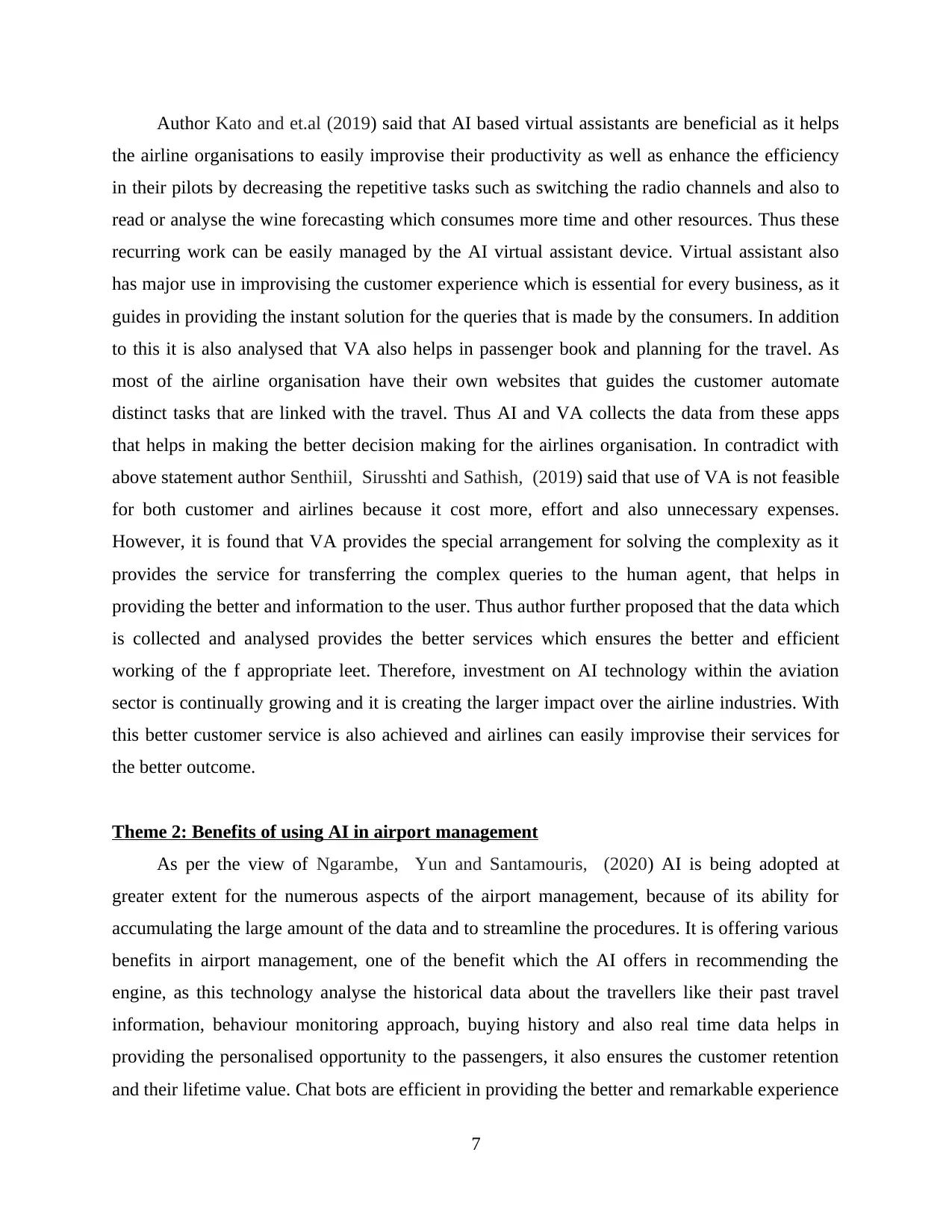
Author Kato and et.al (2019) said that AI based virtual assistants are beneficial as it helps
the airline organisations to easily improvise their productivity as well as enhance the efficiency
in their pilots by decreasing the repetitive tasks such as switching the radio channels and also to
read or analyse the wine forecasting which consumes more time and other resources. Thus these
recurring work can be easily managed by the AI virtual assistant device. Virtual assistant also
has major use in improvising the customer experience which is essential for every business, as it
guides in providing the instant solution for the queries that is made by the consumers. In addition
to this it is also analysed that VA also helps in passenger book and planning for the travel. As
most of the airline organisation have their own websites that guides the customer automate
distinct tasks that are linked with the travel. Thus AI and VA collects the data from these apps
that helps in making the better decision making for the airlines organisation. In contradict with
above statement author Senthiil, Sirusshti and Sathish, (2019) said that use of VA is not feasible
for both customer and airlines because it cost more, effort and also unnecessary expenses.
However, it is found that VA provides the special arrangement for solving the complexity as it
provides the service for transferring the complex queries to the human agent, that helps in
providing the better and information to the user. Thus author further proposed that the data which
is collected and analysed provides the better services which ensures the better and efficient
working of the f appropriate leet. Therefore, investment on AI technology within the aviation
sector is continually growing and it is creating the larger impact over the airline industries. With
this better customer service is also achieved and airlines can easily improvise their services for
the better outcome.
Theme 2: Benefits of using AI in airport management
As per the view of Ngarambe, Yun and Santamouris, (2020) AI is being adopted at
greater extent for the numerous aspects of the airport management, because of its ability for
accumulating the large amount of the data and to streamline the procedures. It is offering various
benefits in airport management, one of the benefit which the AI offers in recommending the
engine, as this technology analyse the historical data about the travellers like their past travel
information, behaviour monitoring approach, buying history and also real time data helps in
providing the personalised opportunity to the passengers, it also ensures the customer retention
and their lifetime value. Chat bots are efficient in providing the better and remarkable experience
7
the airline organisations to easily improvise their productivity as well as enhance the efficiency
in their pilots by decreasing the repetitive tasks such as switching the radio channels and also to
read or analyse the wine forecasting which consumes more time and other resources. Thus these
recurring work can be easily managed by the AI virtual assistant device. Virtual assistant also
has major use in improvising the customer experience which is essential for every business, as it
guides in providing the instant solution for the queries that is made by the consumers. In addition
to this it is also analysed that VA also helps in passenger book and planning for the travel. As
most of the airline organisation have their own websites that guides the customer automate
distinct tasks that are linked with the travel. Thus AI and VA collects the data from these apps
that helps in making the better decision making for the airlines organisation. In contradict with
above statement author Senthiil, Sirusshti and Sathish, (2019) said that use of VA is not feasible
for both customer and airlines because it cost more, effort and also unnecessary expenses.
However, it is found that VA provides the special arrangement for solving the complexity as it
provides the service for transferring the complex queries to the human agent, that helps in
providing the better and information to the user. Thus author further proposed that the data which
is collected and analysed provides the better services which ensures the better and efficient
working of the f appropriate leet. Therefore, investment on AI technology within the aviation
sector is continually growing and it is creating the larger impact over the airline industries. With
this better customer service is also achieved and airlines can easily improvise their services for
the better outcome.
Theme 2: Benefits of using AI in airport management
As per the view of Ngarambe, Yun and Santamouris, (2020) AI is being adopted at
greater extent for the numerous aspects of the airport management, because of its ability for
accumulating the large amount of the data and to streamline the procedures. It is offering various
benefits in airport management, one of the benefit which the AI offers in recommending the
engine, as this technology analyse the historical data about the travellers like their past travel
information, behaviour monitoring approach, buying history and also real time data helps in
providing the personalised opportunity to the passengers, it also ensures the customer retention
and their lifetime value. Chat bots are efficient in providing the better and remarkable experience
7
Paraphrase This Document
Need a fresh take? Get an instant paraphrase of this document with our AI Paraphraser
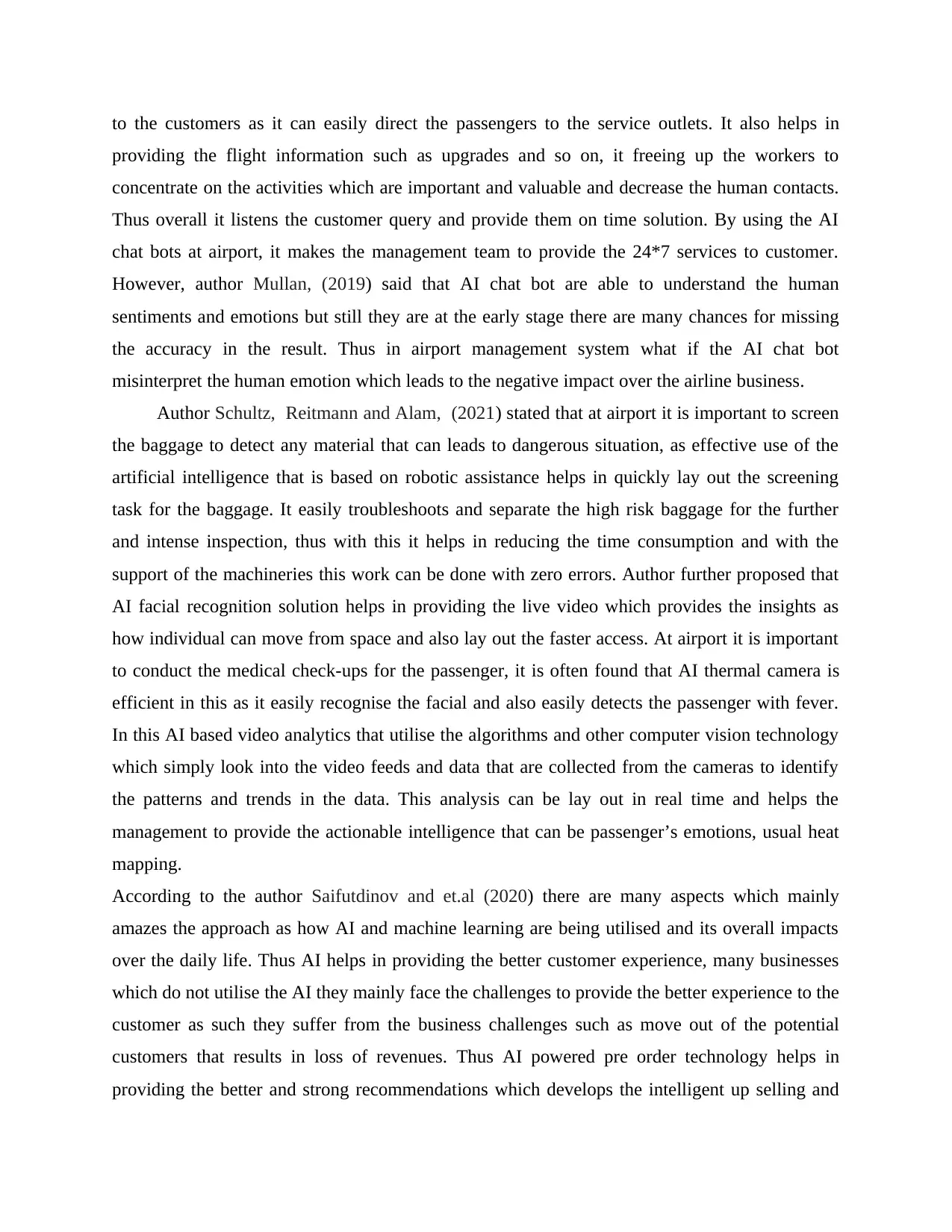
to the customers as it can easily direct the passengers to the service outlets. It also helps in
providing the flight information such as upgrades and so on, it freeing up the workers to
concentrate on the activities which are important and valuable and decrease the human contacts.
Thus overall it listens the customer query and provide them on time solution. By using the AI
chat bots at airport, it makes the management team to provide the 24*7 services to customer.
However, author Mullan, (2019) said that AI chat bot are able to understand the human
sentiments and emotions but still they are at the early stage there are many chances for missing
the accuracy in the result. Thus in airport management system what if the AI chat bot
misinterpret the human emotion which leads to the negative impact over the airline business.
Author Schultz, Reitmann and Alam, (2021) stated that at airport it is important to screen
the baggage to detect any material that can leads to dangerous situation, as effective use of the
artificial intelligence that is based on robotic assistance helps in quickly lay out the screening
task for the baggage. It easily troubleshoots and separate the high risk baggage for the further
and intense inspection, thus with this it helps in reducing the time consumption and with the
support of the machineries this work can be done with zero errors. Author further proposed that
AI facial recognition solution helps in providing the live video which provides the insights as
how individual can move from space and also lay out the faster access. At airport it is important
to conduct the medical check-ups for the passenger, it is often found that AI thermal camera is
efficient in this as it easily recognise the facial and also easily detects the passenger with fever.
In this AI based video analytics that utilise the algorithms and other computer vision technology
which simply look into the video feeds and data that are collected from the cameras to identify
the patterns and trends in the data. This analysis can be lay out in real time and helps the
management to provide the actionable intelligence that can be passenger’s emotions, usual heat
mapping.
According to the author Saifutdinov and et.al (2020) there are many aspects which mainly
amazes the approach as how AI and machine learning are being utilised and its overall impacts
over the daily life. Thus AI helps in providing the better customer experience, many businesses
which do not utilise the AI they mainly face the challenges to provide the better experience to the
customer as such they suffer from the business challenges such as move out of the potential
customers that results in loss of revenues. Thus AI powered pre order technology helps in
providing the better and strong recommendations which develops the intelligent up selling and
providing the flight information such as upgrades and so on, it freeing up the workers to
concentrate on the activities which are important and valuable and decrease the human contacts.
Thus overall it listens the customer query and provide them on time solution. By using the AI
chat bots at airport, it makes the management team to provide the 24*7 services to customer.
However, author Mullan, (2019) said that AI chat bot are able to understand the human
sentiments and emotions but still they are at the early stage there are many chances for missing
the accuracy in the result. Thus in airport management system what if the AI chat bot
misinterpret the human emotion which leads to the negative impact over the airline business.
Author Schultz, Reitmann and Alam, (2021) stated that at airport it is important to screen
the baggage to detect any material that can leads to dangerous situation, as effective use of the
artificial intelligence that is based on robotic assistance helps in quickly lay out the screening
task for the baggage. It easily troubleshoots and separate the high risk baggage for the further
and intense inspection, thus with this it helps in reducing the time consumption and with the
support of the machineries this work can be done with zero errors. Author further proposed that
AI facial recognition solution helps in providing the live video which provides the insights as
how individual can move from space and also lay out the faster access. At airport it is important
to conduct the medical check-ups for the passenger, it is often found that AI thermal camera is
efficient in this as it easily recognise the facial and also easily detects the passenger with fever.
In this AI based video analytics that utilise the algorithms and other computer vision technology
which simply look into the video feeds and data that are collected from the cameras to identify
the patterns and trends in the data. This analysis can be lay out in real time and helps the
management to provide the actionable intelligence that can be passenger’s emotions, usual heat
mapping.
According to the author Saifutdinov and et.al (2020) there are many aspects which mainly
amazes the approach as how AI and machine learning are being utilised and its overall impacts
over the daily life. Thus AI helps in providing the better customer experience, many businesses
which do not utilise the AI they mainly face the challenges to provide the better experience to the
customer as such they suffer from the business challenges such as move out of the potential
customers that results in loss of revenues. Thus AI powered pre order technology helps in
providing the better and strong recommendations which develops the intelligent up selling and
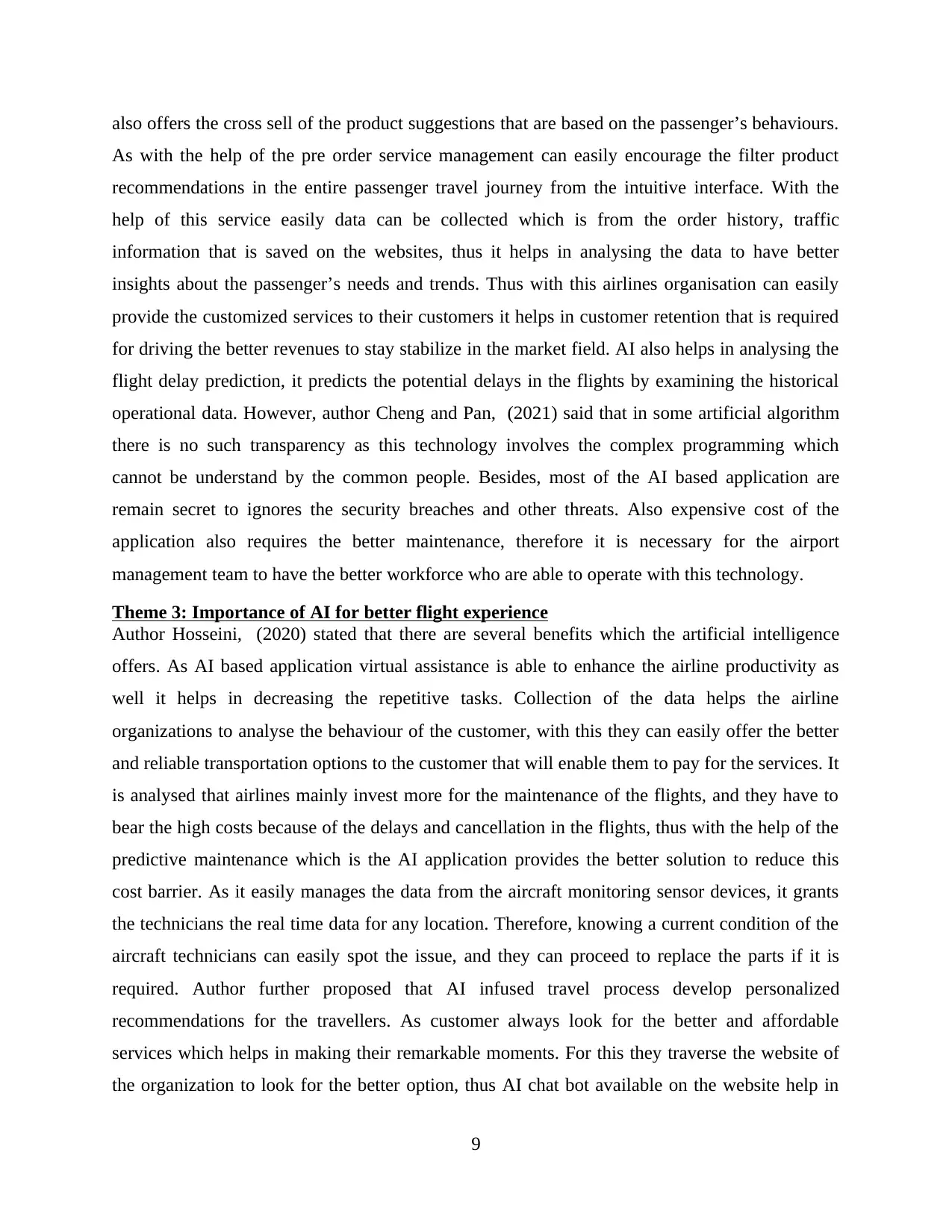
also offers the cross sell of the product suggestions that are based on the passenger’s behaviours.
As with the help of the pre order service management can easily encourage the filter product
recommendations in the entire passenger travel journey from the intuitive interface. With the
help of this service easily data can be collected which is from the order history, traffic
information that is saved on the websites, thus it helps in analysing the data to have better
insights about the passenger’s needs and trends. Thus with this airlines organisation can easily
provide the customized services to their customers it helps in customer retention that is required
for driving the better revenues to stay stabilize in the market field. AI also helps in analysing the
flight delay prediction, it predicts the potential delays in the flights by examining the historical
operational data. However, author Cheng and Pan, (2021) said that in some artificial algorithm
there is no such transparency as this technology involves the complex programming which
cannot be understand by the common people. Besides, most of the AI based application are
remain secret to ignores the security breaches and other threats. Also expensive cost of the
application also requires the better maintenance, therefore it is necessary for the airport
management team to have the better workforce who are able to operate with this technology.
Theme 3: Importance of AI for better flight experience
Author Hosseini, (2020) stated that there are several benefits which the artificial intelligence
offers. As AI based application virtual assistance is able to enhance the airline productivity as
well it helps in decreasing the repetitive tasks. Collection of the data helps the airline
organizations to analyse the behaviour of the customer, with this they can easily offer the better
and reliable transportation options to the customer that will enable them to pay for the services. It
is analysed that airlines mainly invest more for the maintenance of the flights, and they have to
bear the high costs because of the delays and cancellation in the flights, thus with the help of the
predictive maintenance which is the AI application provides the better solution to reduce this
cost barrier. As it easily manages the data from the aircraft monitoring sensor devices, it grants
the technicians the real time data for any location. Therefore, knowing a current condition of the
aircraft technicians can easily spot the issue, and they can proceed to replace the parts if it is
required. Author further proposed that AI infused travel process develop personalized
recommendations for the travellers. As customer always look for the better and affordable
services which helps in making their remarkable moments. For this they traverse the website of
the organization to look for the better option, thus AI chat bot available on the website help in
9
As with the help of the pre order service management can easily encourage the filter product
recommendations in the entire passenger travel journey from the intuitive interface. With the
help of this service easily data can be collected which is from the order history, traffic
information that is saved on the websites, thus it helps in analysing the data to have better
insights about the passenger’s needs and trends. Thus with this airlines organisation can easily
provide the customized services to their customers it helps in customer retention that is required
for driving the better revenues to stay stabilize in the market field. AI also helps in analysing the
flight delay prediction, it predicts the potential delays in the flights by examining the historical
operational data. However, author Cheng and Pan, (2021) said that in some artificial algorithm
there is no such transparency as this technology involves the complex programming which
cannot be understand by the common people. Besides, most of the AI based application are
remain secret to ignores the security breaches and other threats. Also expensive cost of the
application also requires the better maintenance, therefore it is necessary for the airport
management team to have the better workforce who are able to operate with this technology.
Theme 3: Importance of AI for better flight experience
Author Hosseini, (2020) stated that there are several benefits which the artificial intelligence
offers. As AI based application virtual assistance is able to enhance the airline productivity as
well it helps in decreasing the repetitive tasks. Collection of the data helps the airline
organizations to analyse the behaviour of the customer, with this they can easily offer the better
and reliable transportation options to the customer that will enable them to pay for the services. It
is analysed that airlines mainly invest more for the maintenance of the flights, and they have to
bear the high costs because of the delays and cancellation in the flights, thus with the help of the
predictive maintenance which is the AI application provides the better solution to reduce this
cost barrier. As it easily manages the data from the aircraft monitoring sensor devices, it grants
the technicians the real time data for any location. Therefore, knowing a current condition of the
aircraft technicians can easily spot the issue, and they can proceed to replace the parts if it is
required. Author further proposed that AI infused travel process develop personalized
recommendations for the travellers. As customer always look for the better and affordable
services which helps in making their remarkable moments. For this they traverse the website of
the organization to look for the better option, thus AI chat bot available on the website help in
9
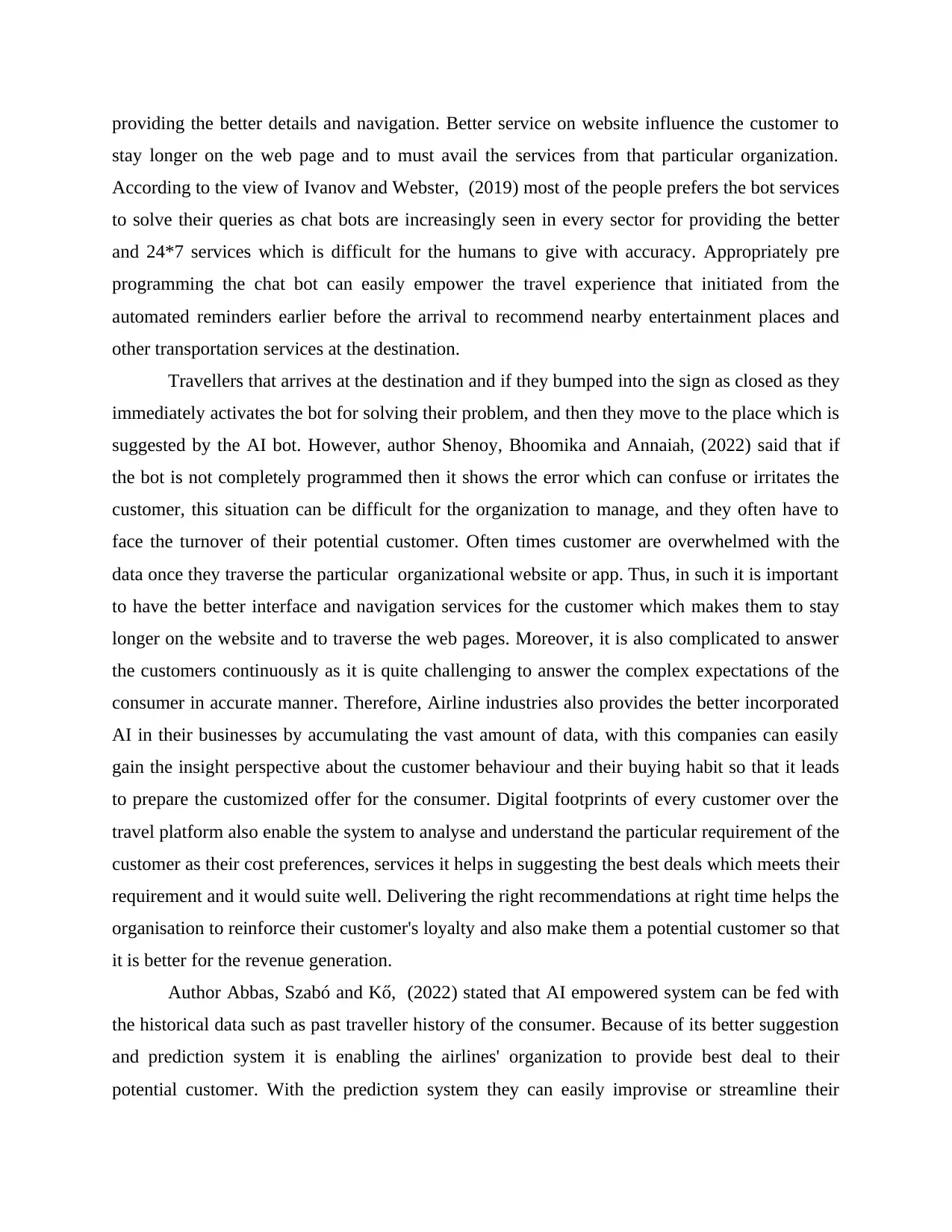
providing the better details and navigation. Better service on website influence the customer to
stay longer on the web page and to must avail the services from that particular organization.
According to the view of Ivanov and Webster, (2019) most of the people prefers the bot services
to solve their queries as chat bots are increasingly seen in every sector for providing the better
and 24*7 services which is difficult for the humans to give with accuracy. Appropriately pre
programming the chat bot can easily empower the travel experience that initiated from the
automated reminders earlier before the arrival to recommend nearby entertainment places and
other transportation services at the destination.
Travellers that arrives at the destination and if they bumped into the sign as closed as they
immediately activates the bot for solving their problem, and then they move to the place which is
suggested by the AI bot. However, author Shenoy, Bhoomika and Annaiah, (2022) said that if
the bot is not completely programmed then it shows the error which can confuse or irritates the
customer, this situation can be difficult for the organization to manage, and they often have to
face the turnover of their potential customer. Often times customer are overwhelmed with the
data once they traverse the particular organizational website or app. Thus, in such it is important
to have the better interface and navigation services for the customer which makes them to stay
longer on the website and to traverse the web pages. Moreover, it is also complicated to answer
the customers continuously as it is quite challenging to answer the complex expectations of the
consumer in accurate manner. Therefore, Airline industries also provides the better incorporated
AI in their businesses by accumulating the vast amount of data, with this companies can easily
gain the insight perspective about the customer behaviour and their buying habit so that it leads
to prepare the customized offer for the consumer. Digital footprints of every customer over the
travel platform also enable the system to analyse and understand the particular requirement of the
customer as their cost preferences, services it helps in suggesting the best deals which meets their
requirement and it would suite well. Delivering the right recommendations at right time helps the
organisation to reinforce their customer's loyalty and also make them a potential customer so that
it is better for the revenue generation.
Author Abbas, Szabó and Kő, (2022) stated that AI empowered system can be fed with
the historical data such as past traveller history of the consumer. Because of its better suggestion
and prediction system it is enabling the airlines' organization to provide best deal to their
potential customer. With the prediction system they can easily improvise or streamline their
stay longer on the web page and to must avail the services from that particular organization.
According to the view of Ivanov and Webster, (2019) most of the people prefers the bot services
to solve their queries as chat bots are increasingly seen in every sector for providing the better
and 24*7 services which is difficult for the humans to give with accuracy. Appropriately pre
programming the chat bot can easily empower the travel experience that initiated from the
automated reminders earlier before the arrival to recommend nearby entertainment places and
other transportation services at the destination.
Travellers that arrives at the destination and if they bumped into the sign as closed as they
immediately activates the bot for solving their problem, and then they move to the place which is
suggested by the AI bot. However, author Shenoy, Bhoomika and Annaiah, (2022) said that if
the bot is not completely programmed then it shows the error which can confuse or irritates the
customer, this situation can be difficult for the organization to manage, and they often have to
face the turnover of their potential customer. Often times customer are overwhelmed with the
data once they traverse the particular organizational website or app. Thus, in such it is important
to have the better interface and navigation services for the customer which makes them to stay
longer on the website and to traverse the web pages. Moreover, it is also complicated to answer
the customers continuously as it is quite challenging to answer the complex expectations of the
consumer in accurate manner. Therefore, Airline industries also provides the better incorporated
AI in their businesses by accumulating the vast amount of data, with this companies can easily
gain the insight perspective about the customer behaviour and their buying habit so that it leads
to prepare the customized offer for the consumer. Digital footprints of every customer over the
travel platform also enable the system to analyse and understand the particular requirement of the
customer as their cost preferences, services it helps in suggesting the best deals which meets their
requirement and it would suite well. Delivering the right recommendations at right time helps the
organisation to reinforce their customer's loyalty and also make them a potential customer so that
it is better for the revenue generation.
Author Abbas, Szabó and Kő, (2022) stated that AI empowered system can be fed with
the historical data such as past traveller history of the consumer. Because of its better suggestion
and prediction system it is enabling the airlines' organization to provide best deal to their
potential customer. With the prediction system they can easily improvise or streamline their
Secure Best Marks with AI Grader
Need help grading? Try our AI Grader for instant feedback on your assignments.
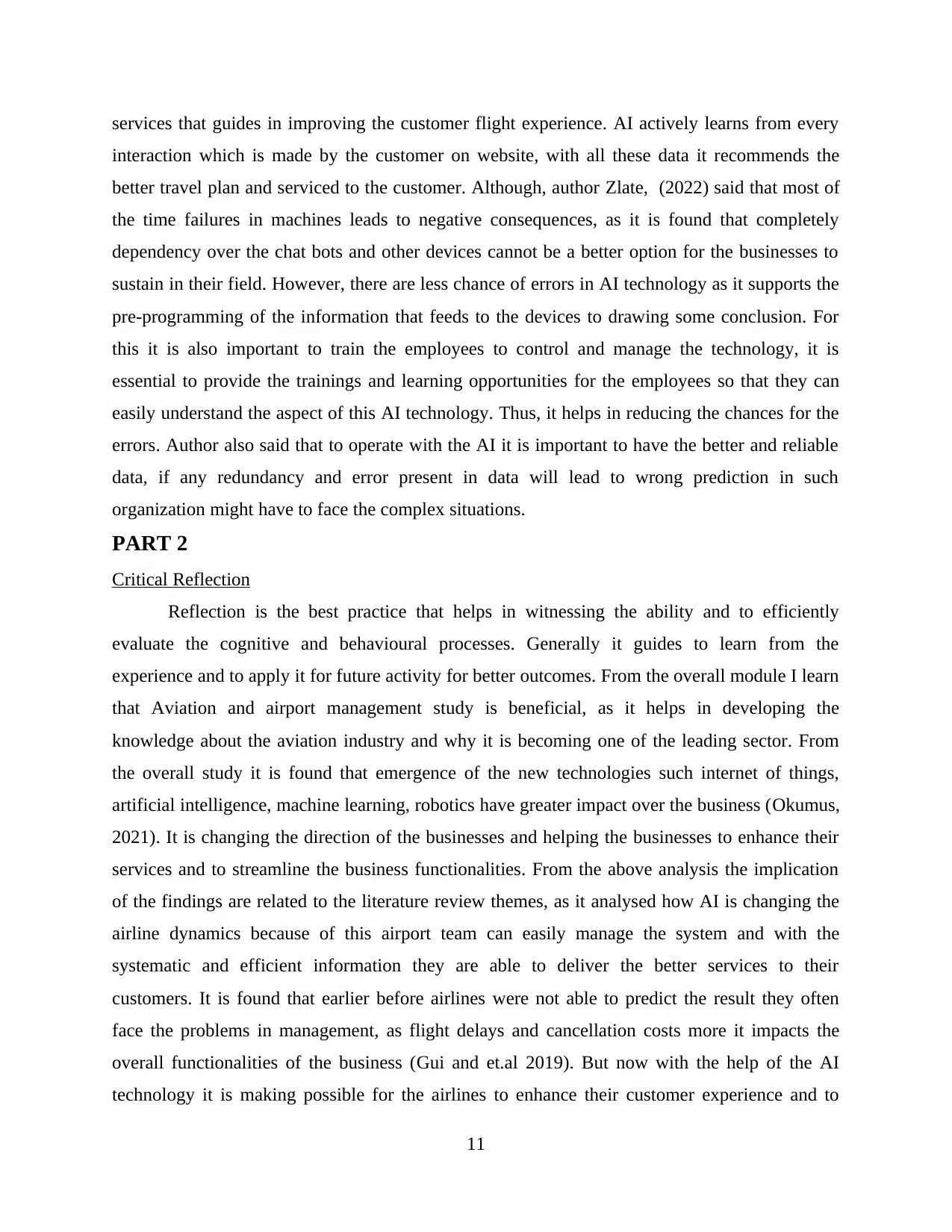
services that guides in improving the customer flight experience. AI actively learns from every
interaction which is made by the customer on website, with all these data it recommends the
better travel plan and serviced to the customer. Although, author Zlate, (2022) said that most of
the time failures in machines leads to negative consequences, as it is found that completely
dependency over the chat bots and other devices cannot be a better option for the businesses to
sustain in their field. However, there are less chance of errors in AI technology as it supports the
pre-programming of the information that feeds to the devices to drawing some conclusion. For
this it is also important to train the employees to control and manage the technology, it is
essential to provide the trainings and learning opportunities for the employees so that they can
easily understand the aspect of this AI technology. Thus, it helps in reducing the chances for the
errors. Author also said that to operate with the AI it is important to have the better and reliable
data, if any redundancy and error present in data will lead to wrong prediction in such
organization might have to face the complex situations.
PART 2
Critical Reflection
Reflection is the best practice that helps in witnessing the ability and to efficiently
evaluate the cognitive and behavioural processes. Generally it guides to learn from the
experience and to apply it for future activity for better outcomes. From the overall module I learn
that Aviation and airport management study is beneficial, as it helps in developing the
knowledge about the aviation industry and why it is becoming one of the leading sector. From
the overall study it is found that emergence of the new technologies such internet of things,
artificial intelligence, machine learning, robotics have greater impact over the business (Okumus,
2021). It is changing the direction of the businesses and helping the businesses to enhance their
services and to streamline the business functionalities. From the above analysis the implication
of the findings are related to the literature review themes, as it analysed how AI is changing the
airline dynamics because of this airport team can easily manage the system and with the
systematic and efficient information they are able to deliver the better services to their
customers. It is found that earlier before airlines were not able to predict the result they often
face the problems in management, as flight delays and cancellation costs more it impacts the
overall functionalities of the business (Gui and et.al 2019). But now with the help of the AI
technology it is making possible for the airlines to enhance their customer experience and to
11
interaction which is made by the customer on website, with all these data it recommends the
better travel plan and serviced to the customer. Although, author Zlate, (2022) said that most of
the time failures in machines leads to negative consequences, as it is found that completely
dependency over the chat bots and other devices cannot be a better option for the businesses to
sustain in their field. However, there are less chance of errors in AI technology as it supports the
pre-programming of the information that feeds to the devices to drawing some conclusion. For
this it is also important to train the employees to control and manage the technology, it is
essential to provide the trainings and learning opportunities for the employees so that they can
easily understand the aspect of this AI technology. Thus, it helps in reducing the chances for the
errors. Author also said that to operate with the AI it is important to have the better and reliable
data, if any redundancy and error present in data will lead to wrong prediction in such
organization might have to face the complex situations.
PART 2
Critical Reflection
Reflection is the best practice that helps in witnessing the ability and to efficiently
evaluate the cognitive and behavioural processes. Generally it guides to learn from the
experience and to apply it for future activity for better outcomes. From the overall module I learn
that Aviation and airport management study is beneficial, as it helps in developing the
knowledge about the aviation industry and why it is becoming one of the leading sector. From
the overall study it is found that emergence of the new technologies such internet of things,
artificial intelligence, machine learning, robotics have greater impact over the business (Okumus,
2021). It is changing the direction of the businesses and helping the businesses to enhance their
services and to streamline the business functionalities. From the above analysis the implication
of the findings are related to the literature review themes, as it analysed how AI is changing the
airline dynamics because of this airport team can easily manage the system and with the
systematic and efficient information they are able to deliver the better services to their
customers. It is found that earlier before airlines were not able to predict the result they often
face the problems in management, as flight delays and cancellation costs more it impacts the
overall functionalities of the business (Gui and et.al 2019). But now with the help of the AI
technology it is making possible for the airlines to enhance their customer experience and to
11
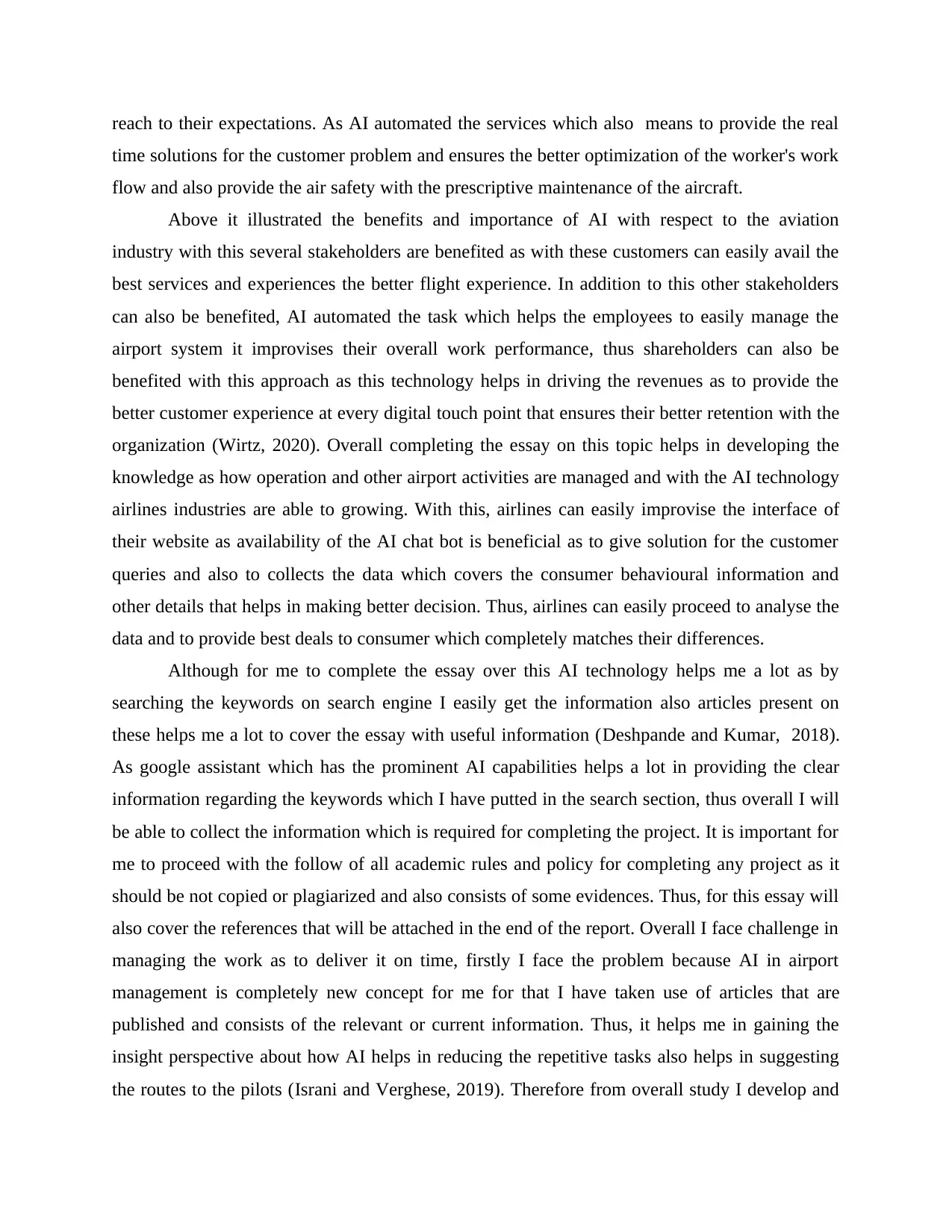
reach to their expectations. As AI automated the services which also means to provide the real
time solutions for the customer problem and ensures the better optimization of the worker's work
flow and also provide the air safety with the prescriptive maintenance of the aircraft.
Above it illustrated the benefits and importance of AI with respect to the aviation
industry with this several stakeholders are benefited as with these customers can easily avail the
best services and experiences the better flight experience. In addition to this other stakeholders
can also be benefited, AI automated the task which helps the employees to easily manage the
airport system it improvises their overall work performance, thus shareholders can also be
benefited with this approach as this technology helps in driving the revenues as to provide the
better customer experience at every digital touch point that ensures their better retention with the
organization (Wirtz, 2020). Overall completing the essay on this topic helps in developing the
knowledge as how operation and other airport activities are managed and with the AI technology
airlines industries are able to growing. With this, airlines can easily improvise the interface of
their website as availability of the AI chat bot is beneficial as to give solution for the customer
queries and also to collects the data which covers the consumer behavioural information and
other details that helps in making better decision. Thus, airlines can easily proceed to analyse the
data and to provide best deals to consumer which completely matches their differences.
Although for me to complete the essay over this AI technology helps me a lot as by
searching the keywords on search engine I easily get the information also articles present on
these helps me a lot to cover the essay with useful information (Deshpande and Kumar, 2018).
As google assistant which has the prominent AI capabilities helps a lot in providing the clear
information regarding the keywords which I have putted in the search section, thus overall I will
be able to collect the information which is required for completing the project. It is important for
me to proceed with the follow of all academic rules and policy for completing any project as it
should be not copied or plagiarized and also consists of some evidences. Thus, for this essay will
also cover the references that will be attached in the end of the report. Overall I face challenge in
managing the work as to deliver it on time, firstly I face the problem because AI in airport
management is completely new concept for me for that I have taken use of articles that are
published and consists of the relevant or current information. Thus, it helps me in gaining the
insight perspective about how AI helps in reducing the repetitive tasks also helps in suggesting
the routes to the pilots (Israni and Verghese, 2019). Therefore from overall study I develop and
time solutions for the customer problem and ensures the better optimization of the worker's work
flow and also provide the air safety with the prescriptive maintenance of the aircraft.
Above it illustrated the benefits and importance of AI with respect to the aviation
industry with this several stakeholders are benefited as with these customers can easily avail the
best services and experiences the better flight experience. In addition to this other stakeholders
can also be benefited, AI automated the task which helps the employees to easily manage the
airport system it improvises their overall work performance, thus shareholders can also be
benefited with this approach as this technology helps in driving the revenues as to provide the
better customer experience at every digital touch point that ensures their better retention with the
organization (Wirtz, 2020). Overall completing the essay on this topic helps in developing the
knowledge as how operation and other airport activities are managed and with the AI technology
airlines industries are able to growing. With this, airlines can easily improvise the interface of
their website as availability of the AI chat bot is beneficial as to give solution for the customer
queries and also to collects the data which covers the consumer behavioural information and
other details that helps in making better decision. Thus, airlines can easily proceed to analyse the
data and to provide best deals to consumer which completely matches their differences.
Although for me to complete the essay over this AI technology helps me a lot as by
searching the keywords on search engine I easily get the information also articles present on
these helps me a lot to cover the essay with useful information (Deshpande and Kumar, 2018).
As google assistant which has the prominent AI capabilities helps a lot in providing the clear
information regarding the keywords which I have putted in the search section, thus overall I will
be able to collect the information which is required for completing the project. It is important for
me to proceed with the follow of all academic rules and policy for completing any project as it
should be not copied or plagiarized and also consists of some evidences. Thus, for this essay will
also cover the references that will be attached in the end of the report. Overall I face challenge in
managing the work as to deliver it on time, firstly I face the problem because AI in airport
management is completely new concept for me for that I have taken use of articles that are
published and consists of the relevant or current information. Thus, it helps me in gaining the
insight perspective about how AI helps in reducing the repetitive tasks also helps in suggesting
the routes to the pilots (Israni and Verghese, 2019). Therefore from overall study I develop and
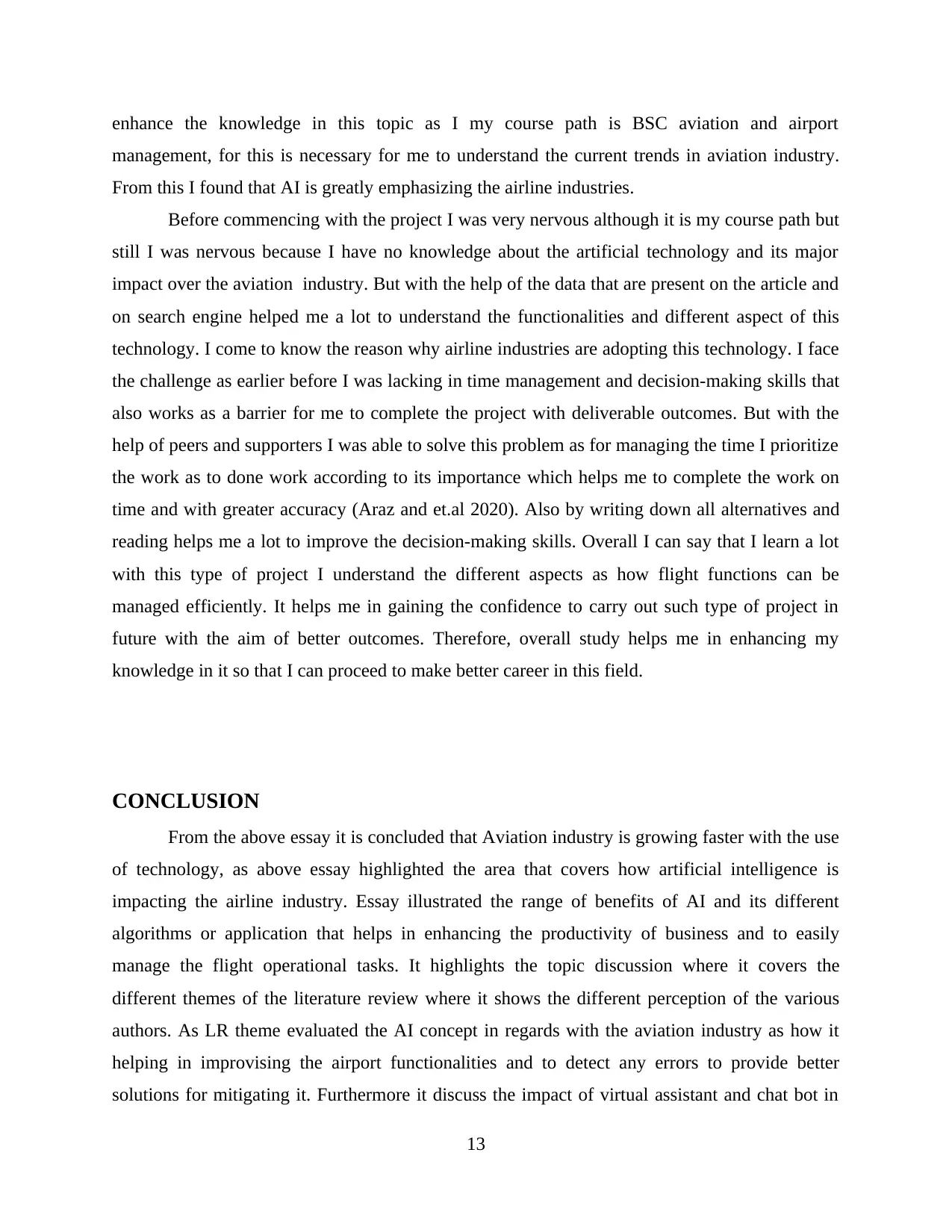
enhance the knowledge in this topic as I my course path is BSC aviation and airport
management, for this is necessary for me to understand the current trends in aviation industry.
From this I found that AI is greatly emphasizing the airline industries.
Before commencing with the project I was very nervous although it is my course path but
still I was nervous because I have no knowledge about the artificial technology and its major
impact over the aviation industry. But with the help of the data that are present on the article and
on search engine helped me a lot to understand the functionalities and different aspect of this
technology. I come to know the reason why airline industries are adopting this technology. I face
the challenge as earlier before I was lacking in time management and decision-making skills that
also works as a barrier for me to complete the project with deliverable outcomes. But with the
help of peers and supporters I was able to solve this problem as for managing the time I prioritize
the work as to done work according to its importance which helps me to complete the work on
time and with greater accuracy (Araz and et.al 2020). Also by writing down all alternatives and
reading helps me a lot to improve the decision-making skills. Overall I can say that I learn a lot
with this type of project I understand the different aspects as how flight functions can be
managed efficiently. It helps me in gaining the confidence to carry out such type of project in
future with the aim of better outcomes. Therefore, overall study helps me in enhancing my
knowledge in it so that I can proceed to make better career in this field.
CONCLUSION
From the above essay it is concluded that Aviation industry is growing faster with the use
of technology, as above essay highlighted the area that covers how artificial intelligence is
impacting the airline industry. Essay illustrated the range of benefits of AI and its different
algorithms or application that helps in enhancing the productivity of business and to easily
manage the flight operational tasks. It highlights the topic discussion where it covers the
different themes of the literature review where it shows the different perception of the various
authors. As LR theme evaluated the AI concept in regards with the aviation industry as how it
helping in improvising the airport functionalities and to detect any errors to provide better
solutions for mitigating it. Furthermore it discuss the impact of virtual assistant and chat bot in
13
management, for this is necessary for me to understand the current trends in aviation industry.
From this I found that AI is greatly emphasizing the airline industries.
Before commencing with the project I was very nervous although it is my course path but
still I was nervous because I have no knowledge about the artificial technology and its major
impact over the aviation industry. But with the help of the data that are present on the article and
on search engine helped me a lot to understand the functionalities and different aspect of this
technology. I come to know the reason why airline industries are adopting this technology. I face
the challenge as earlier before I was lacking in time management and decision-making skills that
also works as a barrier for me to complete the project with deliverable outcomes. But with the
help of peers and supporters I was able to solve this problem as for managing the time I prioritize
the work as to done work according to its importance which helps me to complete the work on
time and with greater accuracy (Araz and et.al 2020). Also by writing down all alternatives and
reading helps me a lot to improve the decision-making skills. Overall I can say that I learn a lot
with this type of project I understand the different aspects as how flight functions can be
managed efficiently. It helps me in gaining the confidence to carry out such type of project in
future with the aim of better outcomes. Therefore, overall study helps me in enhancing my
knowledge in it so that I can proceed to make better career in this field.
CONCLUSION
From the above essay it is concluded that Aviation industry is growing faster with the use
of technology, as above essay highlighted the area that covers how artificial intelligence is
impacting the airline industry. Essay illustrated the range of benefits of AI and its different
algorithms or application that helps in enhancing the productivity of business and to easily
manage the flight operational tasks. It highlights the topic discussion where it covers the
different themes of the literature review where it shows the different perception of the various
authors. As LR theme evaluated the AI concept in regards with the aviation industry as how it
helping in improvising the airport functionalities and to detect any errors to provide better
solutions for mitigating it. Furthermore it discuss the impact of virtual assistant and chat bot in
13
Paraphrase This Document
Need a fresh take? Get an instant paraphrase of this document with our AI Paraphraser
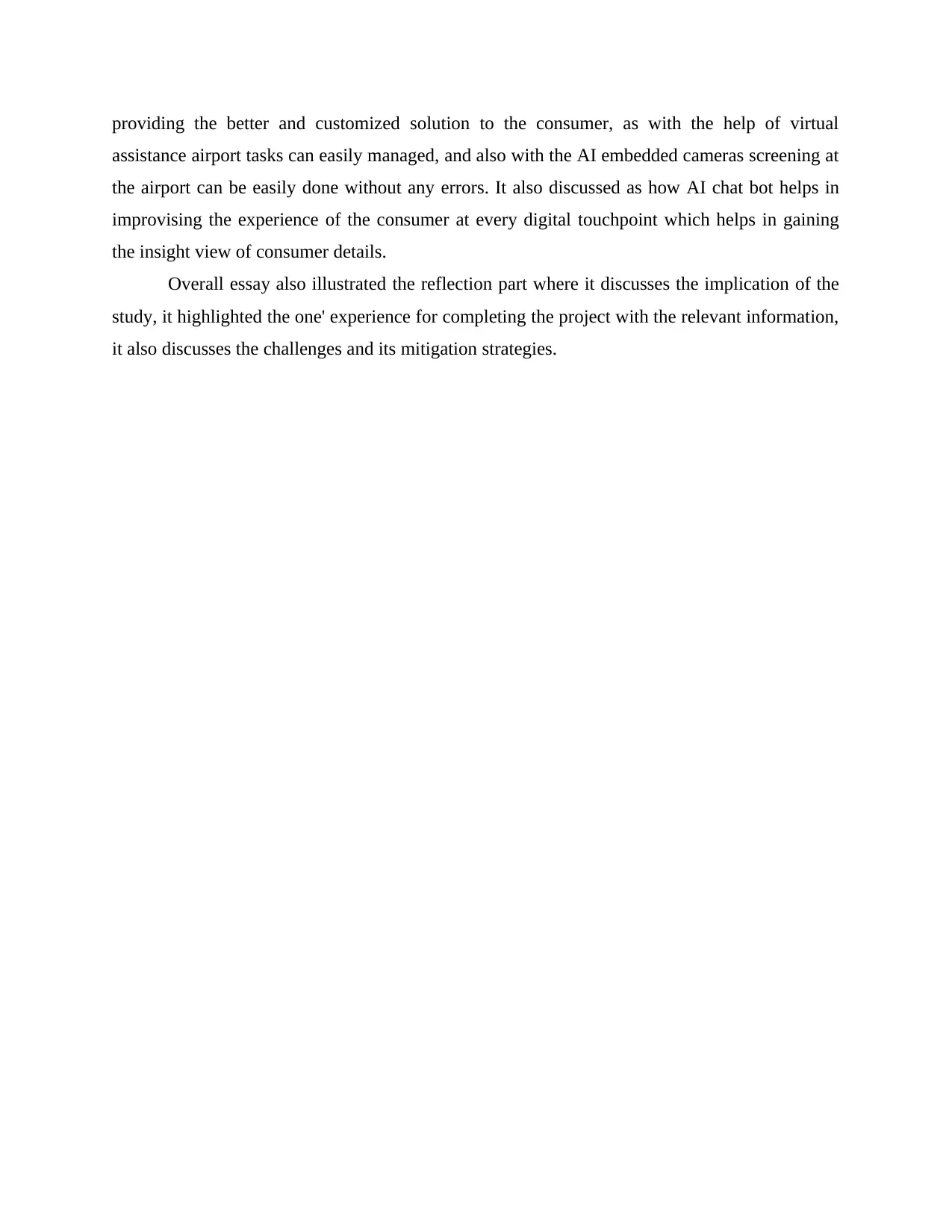
providing the better and customized solution to the consumer, as with the help of virtual
assistance airport tasks can easily managed, and also with the AI embedded cameras screening at
the airport can be easily done without any errors. It also discussed as how AI chat bot helps in
improvising the experience of the consumer at every digital touchpoint which helps in gaining
the insight view of consumer details.
Overall essay also illustrated the reflection part where it discusses the implication of the
study, it highlighted the one' experience for completing the project with the relevant information,
it also discusses the challenges and its mitigation strategies.
assistance airport tasks can easily managed, and also with the AI embedded cameras screening at
the airport can be easily done without any errors. It also discussed as how AI chat bot helps in
improvising the experience of the consumer at every digital touchpoint which helps in gaining
the insight view of consumer details.
Overall essay also illustrated the reflection part where it discusses the implication of the
study, it highlighted the one' experience for completing the project with the relevant information,
it also discusses the challenges and its mitigation strategies.
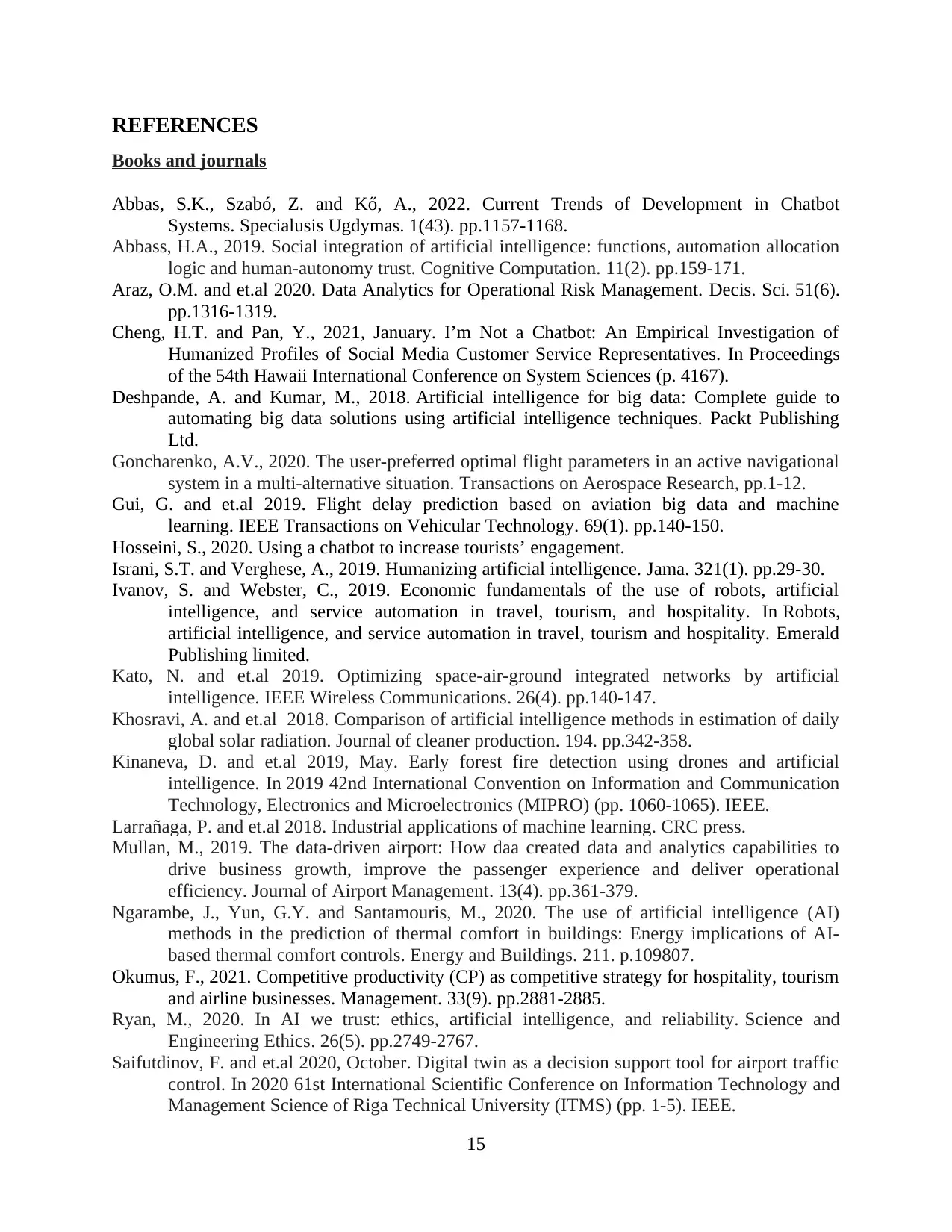
REFERENCES
Books and journals
Abbas, S.K., Szabó, Z. and Kő, A., 2022. Current Trends of Development in Chatbot
Systems. Specialusis Ugdymas. 1(43). pp.1157-1168.
Abbass, H.A., 2019. Social integration of artificial intelligence: functions, automation allocation
logic and human-autonomy trust. Cognitive Computation. 11(2). pp.159-171.
Araz, O.M. and et.al 2020. Data Analytics for Operational Risk Management. Decis. Sci. 51(6).
pp.1316-1319.
Cheng, H.T. and Pan, Y., 2021, January. I’m Not a Chatbot: An Empirical Investigation of
Humanized Profiles of Social Media Customer Service Representatives. In Proceedings
of the 54th Hawaii International Conference on System Sciences (p. 4167).
Deshpande, A. and Kumar, M., 2018. Artificial intelligence for big data: Complete guide to
automating big data solutions using artificial intelligence techniques. Packt Publishing
Ltd.
Goncharenko, A.V., 2020. The user-preferred optimal flight parameters in an active navigational
system in a multi-alternative situation. Transactions on Aerospace Research, pp.1-12.
Gui, G. and et.al 2019. Flight delay prediction based on aviation big data and machine
learning. IEEE Transactions on Vehicular Technology. 69(1). pp.140-150.
Hosseini, S., 2020. Using a chatbot to increase tourists’ engagement.
Israni, S.T. and Verghese, A., 2019. Humanizing artificial intelligence. Jama. 321(1). pp.29-30.
Ivanov, S. and Webster, C., 2019. Economic fundamentals of the use of robots, artificial
intelligence, and service automation in travel, tourism, and hospitality. In Robots,
artificial intelligence, and service automation in travel, tourism and hospitality. Emerald
Publishing limited.
Kato, N. and et.al 2019. Optimizing space-air-ground integrated networks by artificial
intelligence. IEEE Wireless Communications. 26(4). pp.140-147.
Khosravi, A. and et.al 2018. Comparison of artificial intelligence methods in estimation of daily
global solar radiation. Journal of cleaner production. 194. pp.342-358.
Kinaneva, D. and et.al 2019, May. Early forest fire detection using drones and artificial
intelligence. In 2019 42nd International Convention on Information and Communication
Technology, Electronics and Microelectronics (MIPRO) (pp. 1060-1065). IEEE.
Larrañaga, P. and et.al 2018. Industrial applications of machine learning. CRC press.
Mullan, M., 2019. The data-driven airport: How daa created data and analytics capabilities to
drive business growth, improve the passenger experience and deliver operational
efficiency. Journal of Airport Management. 13(4). pp.361-379.
Ngarambe, J., Yun, G.Y. and Santamouris, M., 2020. The use of artificial intelligence (AI)
methods in the prediction of thermal comfort in buildings: Energy implications of AI-
based thermal comfort controls. Energy and Buildings. 211. p.109807.
Okumus, F., 2021. Competitive productivity (CP) as competitive strategy for hospitality, tourism
and airline businesses. Management. 33(9). pp.2881-2885.
Ryan, M., 2020. In AI we trust: ethics, artificial intelligence, and reliability. Science and
Engineering Ethics. 26(5). pp.2749-2767.
Saifutdinov, F. and et.al 2020, October. Digital twin as a decision support tool for airport traffic
control. In 2020 61st International Scientific Conference on Information Technology and
Management Science of Riga Technical University (ITMS) (pp. 1-5). IEEE.
15
Books and journals
Abbas, S.K., Szabó, Z. and Kő, A., 2022. Current Trends of Development in Chatbot
Systems. Specialusis Ugdymas. 1(43). pp.1157-1168.
Abbass, H.A., 2019. Social integration of artificial intelligence: functions, automation allocation
logic and human-autonomy trust. Cognitive Computation. 11(2). pp.159-171.
Araz, O.M. and et.al 2020. Data Analytics for Operational Risk Management. Decis. Sci. 51(6).
pp.1316-1319.
Cheng, H.T. and Pan, Y., 2021, January. I’m Not a Chatbot: An Empirical Investigation of
Humanized Profiles of Social Media Customer Service Representatives. In Proceedings
of the 54th Hawaii International Conference on System Sciences (p. 4167).
Deshpande, A. and Kumar, M., 2018. Artificial intelligence for big data: Complete guide to
automating big data solutions using artificial intelligence techniques. Packt Publishing
Ltd.
Goncharenko, A.V., 2020. The user-preferred optimal flight parameters in an active navigational
system in a multi-alternative situation. Transactions on Aerospace Research, pp.1-12.
Gui, G. and et.al 2019. Flight delay prediction based on aviation big data and machine
learning. IEEE Transactions on Vehicular Technology. 69(1). pp.140-150.
Hosseini, S., 2020. Using a chatbot to increase tourists’ engagement.
Israni, S.T. and Verghese, A., 2019. Humanizing artificial intelligence. Jama. 321(1). pp.29-30.
Ivanov, S. and Webster, C., 2019. Economic fundamentals of the use of robots, artificial
intelligence, and service automation in travel, tourism, and hospitality. In Robots,
artificial intelligence, and service automation in travel, tourism and hospitality. Emerald
Publishing limited.
Kato, N. and et.al 2019. Optimizing space-air-ground integrated networks by artificial
intelligence. IEEE Wireless Communications. 26(4). pp.140-147.
Khosravi, A. and et.al 2018. Comparison of artificial intelligence methods in estimation of daily
global solar radiation. Journal of cleaner production. 194. pp.342-358.
Kinaneva, D. and et.al 2019, May. Early forest fire detection using drones and artificial
intelligence. In 2019 42nd International Convention on Information and Communication
Technology, Electronics and Microelectronics (MIPRO) (pp. 1060-1065). IEEE.
Larrañaga, P. and et.al 2018. Industrial applications of machine learning. CRC press.
Mullan, M., 2019. The data-driven airport: How daa created data and analytics capabilities to
drive business growth, improve the passenger experience and deliver operational
efficiency. Journal of Airport Management. 13(4). pp.361-379.
Ngarambe, J., Yun, G.Y. and Santamouris, M., 2020. The use of artificial intelligence (AI)
methods in the prediction of thermal comfort in buildings: Energy implications of AI-
based thermal comfort controls. Energy and Buildings. 211. p.109807.
Okumus, F., 2021. Competitive productivity (CP) as competitive strategy for hospitality, tourism
and airline businesses. Management. 33(9). pp.2881-2885.
Ryan, M., 2020. In AI we trust: ethics, artificial intelligence, and reliability. Science and
Engineering Ethics. 26(5). pp.2749-2767.
Saifutdinov, F. and et.al 2020, October. Digital twin as a decision support tool for airport traffic
control. In 2020 61st International Scientific Conference on Information Technology and
Management Science of Riga Technical University (ITMS) (pp. 1-5). IEEE.
15
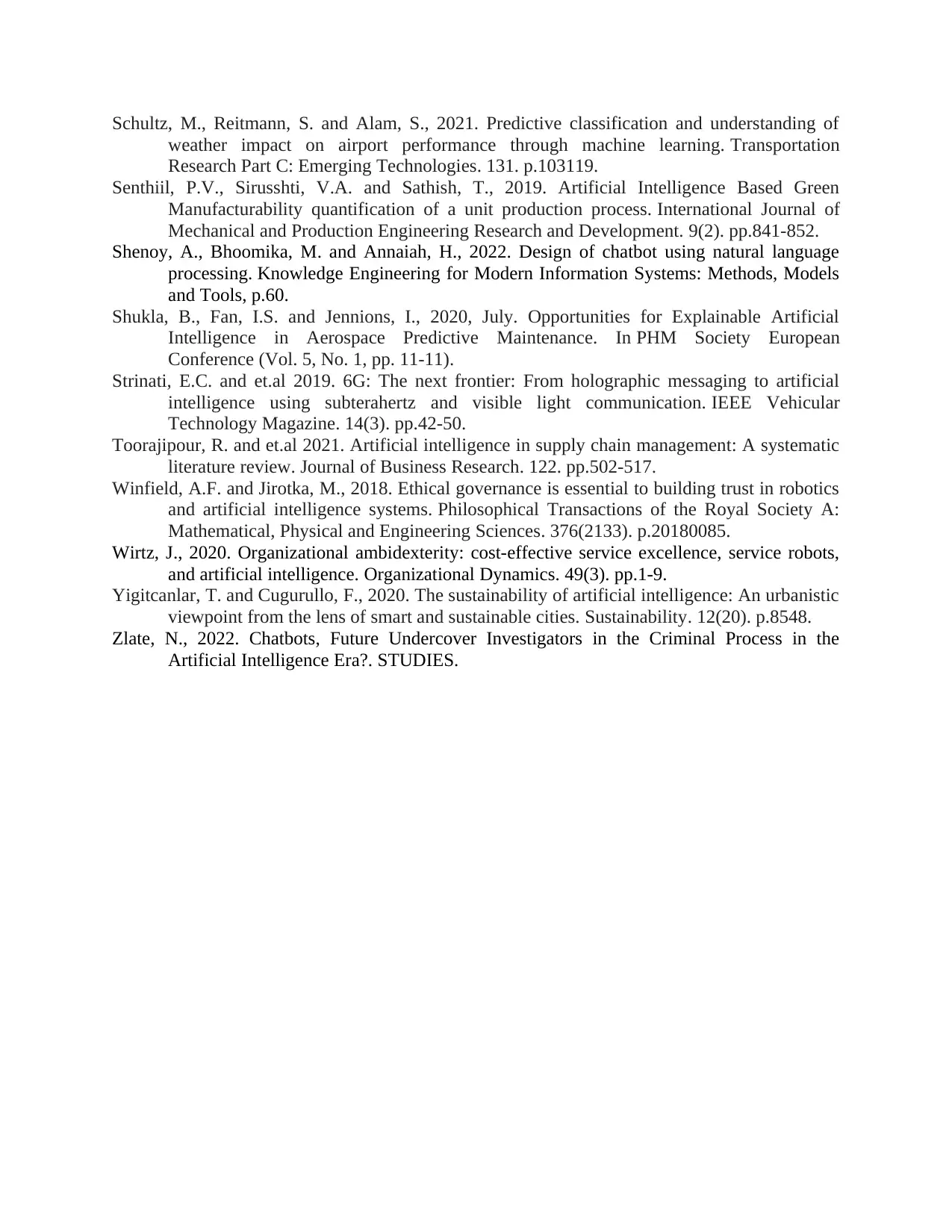
Schultz, M., Reitmann, S. and Alam, S., 2021. Predictive classification and understanding of
weather impact on airport performance through machine learning. Transportation
Research Part C: Emerging Technologies. 131. p.103119.
Senthiil, P.V., Sirusshti, V.A. and Sathish, T., 2019. Artificial Intelligence Based Green
Manufacturability quantification of a unit production process. International Journal of
Mechanical and Production Engineering Research and Development. 9(2). pp.841-852.
Shenoy, A., Bhoomika, M. and Annaiah, H., 2022. Design of chatbot using natural language
processing. Knowledge Engineering for Modern Information Systems: Methods, Models
and Tools, p.60.
Shukla, B., Fan, I.S. and Jennions, I., 2020, July. Opportunities for Explainable Artificial
Intelligence in Aerospace Predictive Maintenance. In PHM Society European
Conference (Vol. 5, No. 1, pp. 11-11).
Strinati, E.C. and et.al 2019. 6G: The next frontier: From holographic messaging to artificial
intelligence using subterahertz and visible light communication. IEEE Vehicular
Technology Magazine. 14(3). pp.42-50.
Toorajipour, R. and et.al 2021. Artificial intelligence in supply chain management: A systematic
literature review. Journal of Business Research. 122. pp.502-517.
Winfield, A.F. and Jirotka, M., 2018. Ethical governance is essential to building trust in robotics
and artificial intelligence systems. Philosophical Transactions of the Royal Society A:
Mathematical, Physical and Engineering Sciences. 376(2133). p.20180085.
Wirtz, J., 2020. Organizational ambidexterity: cost-effective service excellence, service robots,
and artificial intelligence. Organizational Dynamics. 49(3). pp.1-9.
Yigitcanlar, T. and Cugurullo, F., 2020. The sustainability of artificial intelligence: An urbanistic
viewpoint from the lens of smart and sustainable cities. Sustainability. 12(20). p.8548.
Zlate, N., 2022. Chatbots, Future Undercover Investigators in the Criminal Process in the
Artificial Intelligence Era?. STUDIES.
weather impact on airport performance through machine learning. Transportation
Research Part C: Emerging Technologies. 131. p.103119.
Senthiil, P.V., Sirusshti, V.A. and Sathish, T., 2019. Artificial Intelligence Based Green
Manufacturability quantification of a unit production process. International Journal of
Mechanical and Production Engineering Research and Development. 9(2). pp.841-852.
Shenoy, A., Bhoomika, M. and Annaiah, H., 2022. Design of chatbot using natural language
processing. Knowledge Engineering for Modern Information Systems: Methods, Models
and Tools, p.60.
Shukla, B., Fan, I.S. and Jennions, I., 2020, July. Opportunities for Explainable Artificial
Intelligence in Aerospace Predictive Maintenance. In PHM Society European
Conference (Vol. 5, No. 1, pp. 11-11).
Strinati, E.C. and et.al 2019. 6G: The next frontier: From holographic messaging to artificial
intelligence using subterahertz and visible light communication. IEEE Vehicular
Technology Magazine. 14(3). pp.42-50.
Toorajipour, R. and et.al 2021. Artificial intelligence in supply chain management: A systematic
literature review. Journal of Business Research. 122. pp.502-517.
Winfield, A.F. and Jirotka, M., 2018. Ethical governance is essential to building trust in robotics
and artificial intelligence systems. Philosophical Transactions of the Royal Society A:
Mathematical, Physical and Engineering Sciences. 376(2133). p.20180085.
Wirtz, J., 2020. Organizational ambidexterity: cost-effective service excellence, service robots,
and artificial intelligence. Organizational Dynamics. 49(3). pp.1-9.
Yigitcanlar, T. and Cugurullo, F., 2020. The sustainability of artificial intelligence: An urbanistic
viewpoint from the lens of smart and sustainable cities. Sustainability. 12(20). p.8548.
Zlate, N., 2022. Chatbots, Future Undercover Investigators in the Criminal Process in the
Artificial Intelligence Era?. STUDIES.
1 out of 16
Related Documents
Your All-in-One AI-Powered Toolkit for Academic Success.
+13062052269
info@desklib.com
Available 24*7 on WhatsApp / Email
![[object Object]](/_next/static/media/star-bottom.7253800d.svg)
Unlock your academic potential
© 2024 | Zucol Services PVT LTD | All rights reserved.





